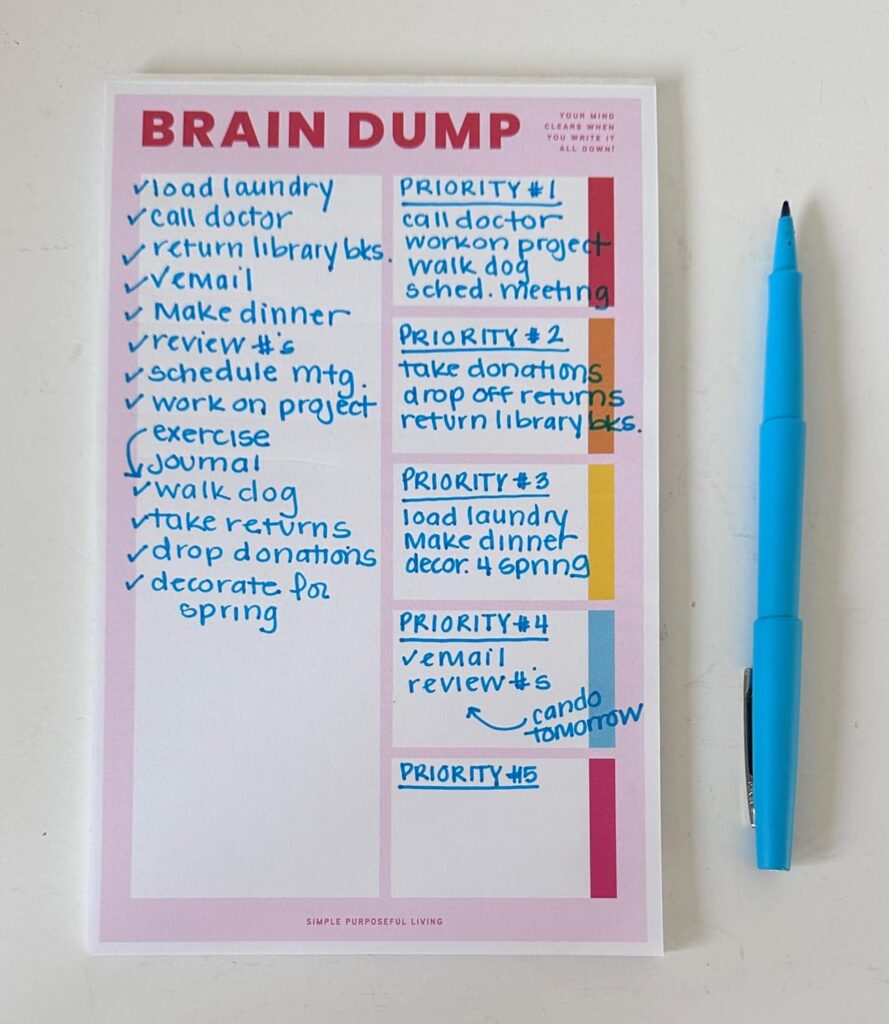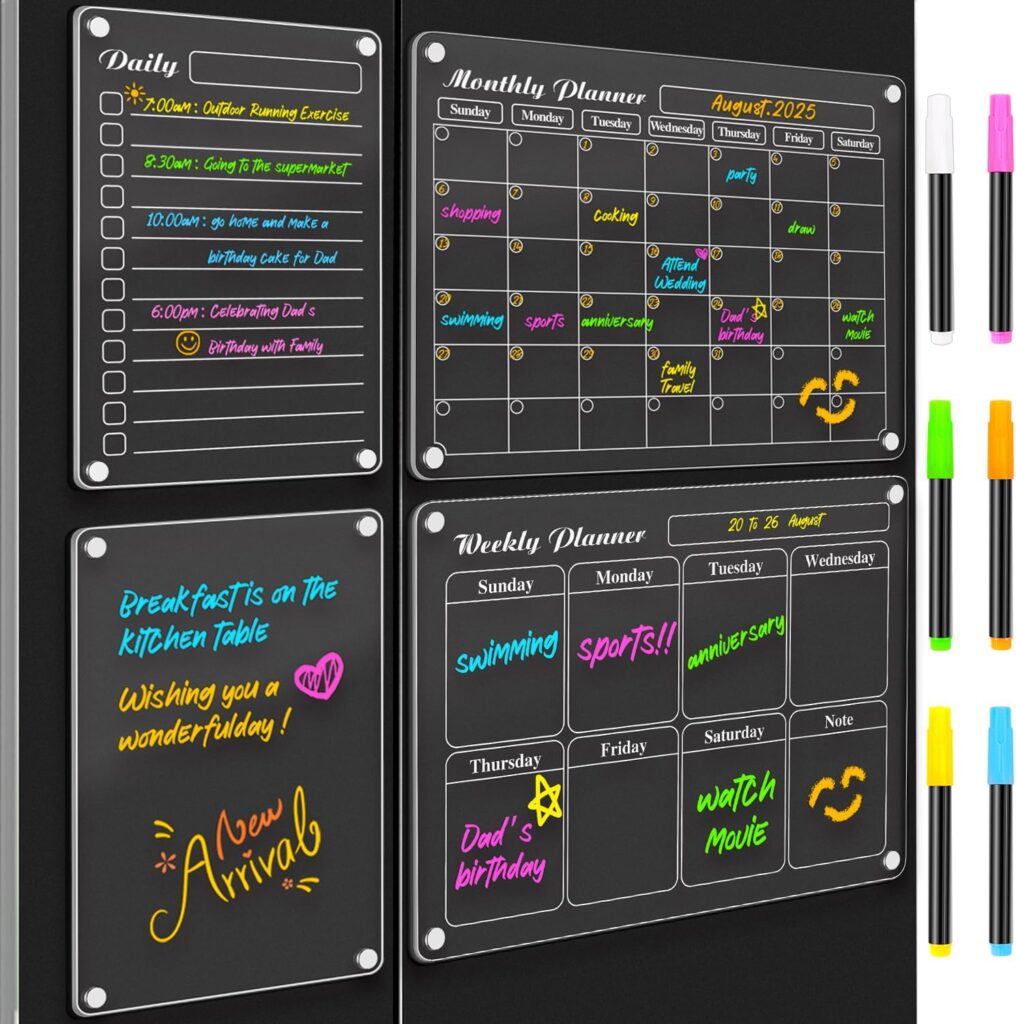
How Saying “NO” Is More Powerful Than Following the Crowd
Saying “No” can be more powerful than following the crowd. Saying “No” could level you up to your greatest potential!
It sounds obvious and easy enough, right? But what if it’s the closest people in your life you have to say “NO” to? Will it be so easy then? Will you feel “fomo”? Will you worry what they will think? Will you worry that they will no longer associate with you? All these fears seep in and fill our minds with doubt before we even try.
I used to worry about what people thought. I pondered what they would think of me if I didn’t go along with every whim and stupid idea. I was a people pleaser and it got me in more trouble than maintaining high standards and being straight forward.
I worked a long time on not being codependent, but rather becoming dependent on God for my validation and worth. With the help of therapy I have been able to rebuild my self awareness and confidence. I have literally turned my life around and become a totally different person. Now I am assertive, confident and strong willed for good reason 🙂
How to Use the Full Power of the Word “NO”
It’s not about saying “no” to everyone and everything, no the point is to have a set plan of action centered around you, your boundaries, and your best self. Here is the question I ask myself before making any decision for a better future.
When it comes to toxic/abusive people, saying “no” could come with major backlash. In the instance of a narcissist’s reaction to hearing you say “no” to them, it could potentially be an explosive situation. If you need help getting away from an abusive partner, family member, or friend, you can go here >
As you design your new life with the intention to live your fullest potential, the word “no” will begin to clear a path that will become more and more direct. As you say “no” for your best interest’s sake, you will become more confident the more you do it. You will feel a sense of pride in yourself. This will lend you courage for the next time, and it will build from there.
Framework: Hear no evil, See no evil, Speak no evil
I’m sure you have heard of the phrase “Hear no evil, see no evil, speak no evil,” an old proverb depicting a timeless expression of moral integrity, self-discipline, and spiritual wisdom. Rooted in ancient Eastern philosophy, particularly from Confucian and Buddhist teachings, this phrase is often symbolized by three monkeys: one covering its ears, one its eyes, and one its mouth.
Although I am not Buddhist, I am aware of the reality that evil exists, which we must defend ourselves against; however, I defend myself with the name of Jesus Christ. My point is that the concepts described are choices we have authority over in our personal lives.
While the exact phrase isn’t in the Bible, the concept of avoiding evil and focusing on good is a recurring theme. The Bible emphasizes turning away from evil thoughts, words, and actions, and striving for righteousness and holiness.
The sentiment is not quoted in the bible; however, various verses and teachings reflect similarities. For instance, Psalm 23:4 states, “Though I walk through the valley of the shadow of death, I will fear no evil,” suggesting an attitude of faith and trust even in difficult times. Additionally, verses in the book of Isaiah, like Isaiah 33, contain themes of resisting evil and focusing on the righteous.
Cripplegate.com has a great article all about “hear no evil, see no evil, speak no evil” and relevance to Christians and the bible.
Here is a little bit more of a breakdown
Hear No Evil
To hear no evil means to guard your mind and heart against negative, harmful, or corrupting words and influences. It is a call to discernment — choosing not to entertain gossip, slander, or toxic speech that could lead you astray or disturb your inner peace.
See No Evil
To see no evil is to be mindful of what you allow into your vision and imagination. It’s an invitation to purity — not in naivety, but in intention. This principle reminds us to turn our eyes away from darkness and to focus instead on beauty, goodness, and truth.
Speak No Evil
To speak no evil urges us to use our words wisely and with love. It’s a challenge to resist the temptation to tear down, criticize unjustly, or spread negativity. Instead, it encourages communication that uplifts, heals, and honors both others and ourselves.
Together, these three guideposts are not just about avoiding sin, they are about actively cultivating character, wisdom, and peace. They teach us to live with conscious awareness, protecting our minds, guarding our hearts, and aligning our actions with integrity.
In essence, “Hear no evil, see no evil, speak no evil” is a reminder that what we consume, witness, and express shapes who we become, and in choosing virtue over vice, we invite light to dwell within us.
What Does Saying “No” Mean for Your Future?
Scripture has Answers
When it comes to separating ourselves from evil, it is necessary to become very acquainted with the word “NO”. It sure is worth it for our future and could be the difference between life and death. Living in the world but not of it is the difference, and just following the crowd is more often the definition of “living of the world”.
- John 17:14-16: Jesus prays that his disciples will be kept from evil, but not taken out of the world, emphasizing their presence in the world while not being of it.
- 1 John 2:15-16: This passage warns against loving the world or its things, as it is incompatible with the love of God.
- Romans 12:2: Paul encourages believers to not be conformed to the pattern of this world but to be transformed by the renewing of their minds
In the passage Matthew 10:22 Jesus says “You will be hated by all for my name’s sake.” He repeats this theme in Matthew 24:9, where he states, “You will be hated by all nations for my name’s sake.” This prediction is also found in Luke 21:17 and John 15:18.
These passages indicate that following Jesus and being associated with His name will inevitably lead to persecution and hatred from the world. The world, in general, is opposed to the truth of Christ and will therefore oppose those who follow Him.
The Power of “No”: Choosing Purpose Over Popularity
A New Perspective
When I look at life through a different lens, (not everyone else’s), one that honors my worth, my voice, and my purpose, it can be easy to get swept up in the current of what others are doing, thinking, or expecting. But sometimes, the most courageous and transformative word to speak is a simple, firm “no.”
Saying no is often more powerful than following the crowd. It’s a declaration that you are no longer willing to abandon your values, your energy, or your dreams just to blend in.
Believe me, I’ve been there. I’ve said no only to take it back because of guilt, pressure, or fear. Every time I did, I learned something deeper about myself. I learned that compromising on what matters to me eventually drains the soul. And I realized that if I wanted to live up to my highest potential, I had to protect it.
How Important Are You in Your Own Life?
Ask yourself truly and honestly, where do you place yourself on your list of priorities?
You might hear people say they love you, that they care, and maybe they do. But here’s a truth we don’t always admit: no one will ever be as invested in your personal dreams, peace, or future as you. No one can fully understand your vision the way you do, and they’re not supposed to. That’s why you must stop waiting for others to give you permission to be who you are.
If you keep following other people’s expectations, you’ll end up living someone else’s version of your life, not your own.
So why allow outside voices to define your direction when your inner voice already knows where to go?
What helps me is writing down what I want to change or remove from my life, which usually takes some big “no’s” to make happen. Next write down what you want to replace what you removed with for example: instead of drinking with friends, say “no” get to bed on time. This way, you’ll feel great the next day and be able to accomplish all you had planned, boosting your confidence.
Saying “No” is Saying “Yes” to Yourself
When you say no to what no longer serves you – toxic patterns, draining relationships, misplaced obligations – you are really saying yes to growth, to peace, and to truth.
You’re choosing:
Alignment over approval
Integrity over image
Growth over comfort
Purpose over popularity
You were not created to shrink, to settle, or to walk a path designed by someone else. You were created with purpose, and living into that purpose requires bold choices.
God Sees You and Supports Saying ‘NO’!
It’s Time to Say “No” – and Mean It
You don’t need to explain your boundaries to everyone. You don’t have to justify why your soul is calling you higher. Sometimes, all you need is the strength to say, “No, thank you. I choose differently.”
Because when you finally start saying no to the things that distract and diminish you, you open up space to say yes to the life you were always meant to live.
Your “No” can be the beginning of your freedom.
And when spoken with clarity and conviction, it becomes one of the most loving things you can do — for yourself, and for the world.
It comes down to drive and how passionate you are about living your truest, fullest potential! Believe me I tried over and over again and learned many lessons when I went back on my own word “NO”.
Saying “NO” can be one of the most empowering decisions you ever make — especially when it means standing apart from the crowd. While it’s often easier to blend in, the power of “no” lies in its ability to create freedom, identity, and direction.
Here’s how saying “no” is more powerful than following the crowd:
It Protects Your Boundaries
Saying no establishes your limits aka boundaries. When you say yes to everything just to please others or fit in, you slowly lose touch with what’s right for you.
When you say no:
You honor your emotional and physical energy.
You protect your time.
You create space for what truly matters.
“Let your ‘yes’ be yes and your ‘no’ be no.” – Matthew 5:37
It Helps You Stand Out, Not Blend In
The crowd often follows trends, avoids conflict, and plays it safe. But real leaders, creators, and changemakers say no to conformity so they can say yes to originality.
Standing up for the truth can mean saying no to many sinful traits, such as:
Saying no to gossip = integrity.
Saying no to peer pressure = strength.
Saying no to fear = courage.
It Paves Your Path
When you say no, you gain clarity on your yes — your values, mission, and passions.
You no longer operate from obligation or fear but from intention.
It Trains You to Trust Yourself
Following the crowd may feel comfortable, but it can leave you uncertain and disconnected from your inner voice. Saying no teaches you to tune into your own intuition and make decisions with confidence.
It Creates Room for Growth
When you stop following what everyone else is doing, you finally have the space to grow into who you were uniquely created to be. You stop settling. You start evolving. You are on your way to building self respect and confidence, which builds trust in yourself, making it easier to say “no” next time.
The Psychology of Separating from the Crowd
#1. Groupthink and Social Pressure
Groupthink is a well-documented psychological phenomenon where people conform to group opinions even if they know it’s wrong—just to maintain harmony or avoid rejection. This idea was made famous by social psychologist Irving Janis.
Key: Saying “no” disrupts groupthink and demonstrates independent thinking, a trait associated with leadership and integrity.
2. The Brain and Self-Control
Saying “no” activates the prefrontal cortex, the brain region responsible for rational decision-making, impulse control, and long-term planning.
- A study from the University of Toronto showed that people who regularly practice self-discipline (like saying “no” to temptations or peer pressure) experience greater life satisfaction, better health, and stronger emotional resilience.
Key: The more you say “no” when it matters, the stronger your brain becomes at resisting immediate gratification in favor of long-term gain.
3. Saying “No” and Self-Determination Theory
Self-Determination Theory (SDT), developed by psychologists Deci and Ryan, states that people thrive when they feel autonomous, competent, and connected. Saying “no” is an act of autonomy, where you are choosing your path rather than letting others dictate it.
Research shows that autonomous decision-making leads to:
- Increased self-esteem
- Higher motivation
- Better mental health
4. The Stress of People-Pleasing
Chronic people-pleasing—saying “yes” when you want to say “no”—can lead to:
- Burnout
- Anxiety and resentment
- Poor self-image
In contrast, learning to say “no” boosts psychological boundaries, which protect your mental and emotional health.
Key: Saying “no” is an act of emotional hygiene—it guards your energy and mental clarity.
#5. Social Experiments and Peer Resistance
In the famous Asch conformity experiments, participants gave wrong answers to obvious questions just to match the group. However, when even one person in the group gave a correct, dissenting answer, the rate of conformity dropped significantly.
Does God Honor Saying “No” When It’s Good for Us?
There’s a quiet power in the word “no.” It doesn’t shout. It doesn’t always get celebrated. Yet it can mark the beginning of healing and setting new boundaries for growth and newfound freedom. Many of us wrestle with guilt when we say “no.” Especially if we’re used to people pleasing or we’ve been raised to equate kindness with compliance. But what if saying “no” is not only okay… what if it’s righteous?
What if God actually honors our “no” when it protects our purpose, health, peace, and spirit?
The God of Wisdom and Love, Not Burnout
We know God is Love. He’s not sitting up there with a clipboard, tallying up our yes’s to use it against us. Cause and effect in our natural element makes us suffer enough for saying yes to everything. God does give us wisdom and discernment when we call on him and read His word.
Jesus Himself, our perfect example, said “no” often.
He said no to distractions.
He said no to manipulative traps.
He said no to crowds when it was time to rest.
He even said no to good things like healing more people in one town so He could follow the greater call God placed on His life.
Jesus knew His purpose. And He honored it by choosing focus over pressure, truth over people-pleasing, and obedience over popularity.
People pleasing has been a real battle for me. It pretty much ran my life for years. It was not too long ago that I learned how to control this pattern by saying “no” when it meant for my own good.
Boundaries Are Biblical
The Bible is full of moments where saying “no” aligned with God’s will:
Nehemiah said “no” to distractions while rebuilding the wall (Nehemiah 6:3).
Daniel said “no” to defiling food to remain faithful to God (Daniel 1:8).
Moses had to say “no” to being a prince of Egypt to become the deliverer of Israel (Hebrews 11:24-26).
God didn’t punish them for their refusals, He blessed them. Because those “no’s” were actually “yes’s” to His greater plan.
God Cares About What’s Good for You
We often forget: God is not only concerned with what you do — He deeply cares about who you are becoming.
If a “yes” steals your peace, depletes your joy, and distracts you from your calling, then saying “no” is not selfish. It’s wise. And God honors wisdom.
“Above all else, guard your heart, for everything you do flows from it.”
— Proverbs 4:23
Sometimes, the most sacred thing you can do is guard your heart with a boundary.
God’s grace does not require you to betray yourself. You can say “no” with love and still walk in the Spirit.
When You Say No For Your Best Future, God Always Has Your Back
Saying “NO” in the beginning is going to be hard, especially if you’re not used to it, but with practice it gets easier. Over time of respecting your space and boundaries you will grow self-confidence. Self-confidence is addictive and builds on itself.
Conclusion to: Saying “No” Is More Powerful Than Following the Crowd
In a world full of pressure to conform, saying “no” can take courage to stand up against the norm. The majority of people are quick to go with the world, it’s referred to as peer pressure. Following the crowd is the easiest way to go, but it takes real guts and a steadfast heart to make strong healthy choices for your future. Saying “no” sets you apart, it gives you a jump ahead of the crowd. Though it might feel lonely or even resented by others, you will reap the benefits of your intentional commitment in no time.


How to Change Your Life for Good: Steps That Make It Possible
Have you ever felt the deep desire to change your life, only to be met with resistance at every turn?
You commit to becoming healthier, more productive, more at peace… but somehow, the world pushes back. The moment you step toward growth, it’s as if life throws obstacles in your path—distractions, doubts, discouragement. You feel overwhelmed, like the person you’re trying to become is too far away, too unlike who you’ve always been.
Maybe you’ve told yourself this is the time. Maybe you’ve envisioned a fresh start more times than you can count. But the truth is, when change feels too big, too sudden, it can trigger fear. You start to believe you have to give everything up to gain anything at all. You may feel unsupported, misunderstood, or completely alone on the journey. It’s time like these that either brake you or make you. What I mean is, you can either allow your outer circumstances to brake your decision to change your life or you can use the struggle to overcome and become stronger as you beat your challenges. Best part is Jesus has already overcome the world and we are given his same strength when we believe.
And perhaps hardest of all, you begin to doubt your own voice—the promises you’ve made to yourself that you haven’t yet been able to keep.
You’re Not Failing—You’re Facing the Real Struggle of Change
These emotions aren’t a sign of weakness. They are part of the process. Real, meaningful change isn’t a straight path—it’s a winding, often difficult one. But it is possible. And no, it’s not a secret reserved for the lucky few. It’s about mindset. It’s about showing up again and again, even when the progress feels invisible. This is why a tracking journal is very helpful.
In this article, I want to share the real-life journey of what it takes to create transformation that actually lasts—not just surface change, but a deep shift in how you see yourself and what you believe is possible.
My Personal Story: From Cycles to Clarity
To be honest, it felt like it took me a lifetime to truly change my life (and I say that with a smile now). But once I learned the keys, it was like uncovering a quiet truth that had been waiting for me all along.
I’ve lived with ADHD for years. It’s labeled a “disability,” and for a long time, I believed that narrative. I let every flaw, every limitation, become a roadblock. I wore them like a heavy coat, believing they disqualified me from growth.
I tried again and again to build better habits: to wake up earlier, eat cleaner, be more organized. And every time I stumbled, I internalized it as failure. I felt trapped in a cycle of good intentions and dashed hopes—like playing an emotional game of ring-around-the-rosy that always ended in the same place.
But Here’s What I Finally Learned
Change doesn’t happen when you bully yourself into becoming someone new.
It happens when you start honoring who you already are and build from there.
With the help of God and guidance from my therapist, I’ve learned to trust my own inner voice, choosing what’s truly best for me and letting go of the need for validation from the voices of my past.
It’s not about doing it all at once.
You don’t need permission or perfect conditions.
You just need a willing heart, an open mind, and the courage to try again—with grace this time.
Real change doesn’t happen in a moment—it happens in a mindset that evolves. If you’ve ever found yourself stuck in old patterns, wondering why your best intentions never seem to stick, you’re not alone. Transformation isn’t about becoming someone else; it’s about becoming more aligned with who you truly are.
#1. Mindset: Change Your Life
–Developing a New Program
To change your life, you must first change the program you’re running in your mind. So many of us are operating on outdated mental software—stories we were told as children, fears inherited from others, and beliefs shaped by disappointment. This internal programming quietly dictates how we view ourselves, what we believe we’re capable of, and whether we even try.
The key to rewriting that script is awareness. Start listening to the thoughts you think the most. Are they encouraging or defeating? Do they call you higher, or keep you small?
Changing your mindset isn’t about toxic positivity—it’s about becoming intentional. Develop a new inner dialogue that speaks possibility, not limitation. Say things like:
- “I’m becoming someone who shows up for myself.”
- “I am worthy of change, even before it shows.”
- “I’m allowed to grow slowly.”
The moment you shift your inner narrative is the moment real transformation begins.
#2. Micro-Changes: Change Your Life
–The Key to Successful Change
Big, dramatic overhauls often lead to burnout. The secret to lasting change? Micro-changes—small, consistent steps that feel doable even on your hardest days.
Want to wake up earlier? Start by getting up just 10 minutes sooner.
Want to eat better? Begin with one healthier choice each day.
Want to reduce anxiety? Practice deep breathing for just 30 seconds when stress hits.
These small wins build momentum. They rebuild trust in yourself, proving you can follow through. Over time, these tiny habits compound into major transformation, without the pressure or overwhelm of an all-or-nothing approach.
| Science Behind Micro Changes |
The science behind micro changes—also known as small habits, atomic habits, or tiny behaviors—is rooted in behavioral psychology and neuroscience. These small, consistent adjustments can create long-term transformation because they are easy to implement, reduce resistance, and compound over time. Here’s a breakdown of the science:
Habits Form Through Repetition and Reward
According to behavioral science, habits are formed via the cue–routine–reward loop (from Charles Duhigg’s The Power of Habit). Micro changes allow your brain to repeat a positive behavior without overwhelming cognitive resistance. Because the behavior is so small, it doesn’t trigger the brain’s fear center (amygdala), which often resists big changes.
The Compound Effect of Tiny Behaviors
James Clear’s book Atomic Habits popularized the idea that small changes, repeated daily, result in remarkable outcomes over time. He explains:
“Habits are the compound interest of self-improvement.”
A 1% improvement each day compounds to nearly 38 times better over a year. This principle shows that success isn’t about one big shift—it’s about consistency with small steps.
“It’s called the principle of ‘aggregate marginal gains’, and is the idea that if you improve by just 1% consistently, those small gains will add up to remarkable improvement. We see this everywhere in our lives. Saving small amounts of money over time can build big sums with the power of compound interest.” – Duke Corporate Education
Neuroplasticity Makes Change Possible
Micro changes work with your brain’s neuroplasticity—its ability to rewire and adapt. Each small habit creates new neural pathways. The more often a habit is practiced, the stronger the pathway becomes. Big, drastic changes often trigger anxiety and stress, making it harder for the brain to adapt. Micro changes bypass that by feeling doable and positive.
Behavioral Momentum and Motivation
According to BJ Fogg, a behavior scientist at Stanford, tiny habits build momentum. In his Tiny Habits method, he teaches that motivation isn’t reliable, but starting small makes success feel inevitable. For example:
- Instead of “run 3 miles,” start with “put on running shoes.”
- Instead of “eat clean,” start with “add 1 veggie per meal.”
Micro changes tap into the dopamine system too: each small win releases dopamine, reinforcing the behavior and increasing motivation over time.
Cognitive Load and Willpower
Large goals often drain willpower and increase decision fatigue. Micro changes lower the mental barrier to action. Since the change is so small (e.g., flossing one tooth, writing one sentence), it feels achievable and doesn’t deplete your mental energy.
Remember: consistency beats intensity. Every little step matters.
#3. Forgiveness: Change Your Life
–The Missing Link Between You and Change
If you’ve struggled to change before, you might be carrying hidden shame or self-blame. Without realizing it, you may be punishing yourself for past failures—and keeping yourself from trying again.
This is where forgiveness becomes essential. Forgiveness isn’t about letting yourself off the hook—it’s about releasing yourself from the chains of yesterday so you can walk freely into tomorrow.
Forgive yourself for quitting. For not knowing better. For the times you stayed stuck longer than you needed to. Every step you’ve taken has led you here, and you’re growing now.
Change becomes possible when we stop identifying with who we were and begin showing compassion to who we are becoming.
| How God Can Help Change Your Life |
God can absolutely help change your life for good—and not just in a temporary or surface-level way, but in a deep, soul-renewing, life-transforming way. When we invite God into the process of change, we’re not walking alone—we’re walking with the Creator who knows us fully and loves us completely.
Here are a few ways God helps bring lasting transformation
God Gives You a New Identity
When you accept God’s love and truth, your identity is no longer based on your past, your failures, or others’ opinions.
2 Corinthians 5:17 says, “If anyone is in Christ, he is a new creation. The old has passed away; behold, the new has come.”
God doesn’t just fix the old you—He makes you new. When you understand your worth in Him, you’re no longer driven by fear or insecurity.
God Renews Your Mind
True change begins in the mind. God’s Word helps rewire old thought patterns that keep you stuck.
Romans 12:2 encourages, “Do not conform to the pattern of this world, but be transformed by the renewing of your mind.”
As you meditate on Scripture and God’s truth, your thinking begins to align with His, and that shifts your actions and attitudes.
God Gives Strength for the Journey
Change is hard, but you don’t have to do it alone. God empowers you through the Holy Spirit.
Philippians 4:13 says, “I can do all things through Christ who strengthens me.”
When your own willpower runs out, His power steps in.
God Heals What Holds You Back
Many of the things that keep us from changing are emotional wounds or lies we’ve believed. God brings healing to those broken places.
Psalm 147:3 says, “He heals the brokenhearted and binds up their wounds.”
With God’s love, you can forgive, let go, and move forward.
God Offers Grace and New Beginnings
You don’t have to be perfect to come to God—He meets you where you are.
Lamentations 3:22-23 reminds us, “His mercies are new every morning.”
Each day is a fresh start with Him. Grace gives you room to grow without shame.
God Believes in YOU
When God is at the center of your life, transformation is not just possible—it’s promised. He gives you the purpose, the strength, and the love needed to become who He created you to be. Let His love be the foundation of your change, and you’ll experience peace, purpose, and lasting growth.
Here are a couple realistic and tangible things I did to help make Real Change in my Life
Stop “All or Nothing” Slow Down, it takes time.
Prayer (I prayed for strength everyday)
Reading my Bible gave me wisdom and developed unshakeable faith I could do all things through Christ who strengthens me.
Journal
Exercise (for your mind, not just for your body)
Therapy
You Can Change Your Life—One Step at a Time, Trust the Process, & Keep Going
Change is not a switch to flip—it’s a seed to nurture.
You don’t need to be perfect to begin. You only need to be willing. With a new mindset, small intentional steps, and the grace of forgiveness, you can begin writing a new chapter—one that reflects who you truly are and what you deeply desire.
You have everything within you to become the person you’ve always longed to be.
It’s not too late.
Now is the best time to start.
Here are more posts that you might relate to
How to Like Yourself Better and Build Confidence

How to Like Yourself and Build Confidence
If you struggle to like yourself, I want you to know—I see you, and I’m here with you.
There were many years when I felt the same. I didn’t like how I silenced my own voice, how I allowed myself to shrink in the presence of others just to keep the peace. My days were spent people-pleasing, pouring out so much of myself that by nightfall, I had nothing left for me. There were moments—dark ones—when I didn’t just dislike myself…I despised who I had become. I didn’t understand how to value myself, let alone how to like who I was.
I grew up homeschooled and profoundly sheltered, with little exposure to social interaction beyond the walls of my home. In those days, the internet was still new, dial-up was a luxury, and social platforms didn’t exist. Though I had the heart of an extrovert, I was never given the space to express it. My family, like many, unknowingly placed us in identity boxes—labels we carried into adulthood. That kind of upbringing plants seeds of self-doubt and comparison that are difficult to shake, which is why I now find healing in therapy and a relationship with God my creator. Don’t forget a little humor goes a long way. Don’t take yourself too seriously, you don’t always have to be struggling against the current. Forgiveness, compassion and just letting things role off your shoulders gives you relief from the battle within. Learning to control trigger reactions will maintain your confidence. You will defy the assumption that you are weak and over time, you will stand tall in confidence. God wants to fight our battles and give us peace in return, this will change your world!
Growing up I was consistently instilled with a sense of “how could you?” “Who do you think you are?” “Self-love is selfish”, “Liking yourself is wrong”. No wonder I grew up to be an insecure disaster. The only one that stood next to me was God, my protector and guidance counselor. I grew up in a “religious” environment; however, this does not mean a loving environment. Many people associate “religion” or being “religious” with God; sadly, this is ignorance, a big misunderstanding. People take advantage of powerful roles such as a “religious” one and program young people to follow what they say, versus teaching them to listen to God. In my opinion, religion separates people from God. It was a tool/program designed (by evil men) to manipulate the spiritual growth of the human spirit. However don’t get me wrong, I believe that a relationship with God and Jesus is a personal connection through the Holy Spirit, not through the opinions or construct of a corrupt program.
Confidence isn’t something you’re born with—it’s something you build.
For me, it’s felt like a lifelong journey. True confidence isn’t arrogance or ego—those are often inherited traits from narcissistic influences. Real confidence comes from learning to truly like yourself. It comes from honoring your voice, setting boundaries, and protecting the space where your self-worth lives.
The world won’t stop testing you. It will keep triggering old wounds, poking at the insecurities you thought you’d outgrown. That’s why learning to protect your peace and not overreact to the noise around you is so important. Every day, we are given the opportunity to choose ourselves—to show up, not as who we were told to be, but as who we’re finally becoming.
Habits to Start Liking Yourself Better
Liking yourself isn’t about vanity or ego—it’s about cultivating a quiet, rooted sense of peace and self-respect. When you genuinely like who you are, everything in life—from relationships to routines—feels lighter, more aligned, and more joyful.
But how do you actually begin to like yourself more, especially when negative self-talk has been your inner soundtrack for years?
Start with these gentle, transformative habits. They don’t demand perfection—just your presence.
Start Your Day With an Uplifting Routine
Before scrolling or rushing into the world, spend even just 5 minutes with you and God.
- Light a candle.
- Say a prayer or affirmation.
- Sip your coffee/tea slowly and breathe.
“I am worthy of love—especially from myself.”
This sets the tone: calm, intentional, and kind.
Keep a “Proof of Goodness” Journal
Every day, write down:
- One thing you did well.
- One kind thing you said or felt.
- One moment you kept going.
It can be tiny. “I got out of bed even when I felt heavy” is a triumph.
Over time, this becomes evidence of your worth—not just feelings.
Talk to Yourself Like Someone You Love
Would you say to your best friend what you say to yourself in the mirror?
Practice:
- “I’m proud of how far I’ve come.”
- “It’s okay to rest.”
- “I am learning. I don’t need to have it all figured out.”
Words shape belief. Let yours be grounded and encouraging.
Create More Than You Consume
Whether it’s cooking a meal, journaling, drawing, or rearranging a room—creation builds self-trust.
You’re showing yourself: “I have value. I can add beauty to the world.”
Even organizing a drawer or making a to-do list is creative energy.
Set Boundaries Without Guilt
Saying “no” is an act of self-respect.
Every time you honor your time, energy, or peace—you reinforce to your inner self:
“You matter. You don’t have to earn rest, respect, or space.”
Give Yourself Grace When You Mess Up
Liking yourself isn’t about being perfect—it’s about being human and treating yourself gently when you’re not at your best.
Instead of shame, ask:
- What was I feeling?
- What do I need?
- What can I learn?
This is how emotional maturity grows—and self-love with it.
Do One Brave Thing a Week
Send the message: “I believe in you.”
- Speak up when you’d usually stay quiet.
- Try something new, even if you’re unsure.
- Show up as your real self, not your edited one.
Liking yourself grows in the space between courage and compassion.
Build Confidence and Finally Like Who You Are Becoming
There’s something sacred about growing into someone you genuinely like—someone you’re proud of. Not because you’re perfect, but because you showed up, you kept going, and you chose growth even when it was uncomfortable.
Confidence isn’t loud. It doesn’t need to shout. Real confidence is a quiet, grounded presence. It’s knowing who you are, honoring your value, and letting that self-trust carry you forward—even when no one’s watching.
But how do we build that confidence? How do we go from doubting ourselves to finally liking who we’re becoming?
Build Confidence Intentionally
It starts with intention—and a whole lot of grace.
Grow Roots Before Reaching
Before you try to “glow up” or “level up,” ask yourself:
What’s driving me?
Confidence built on comparison crumbles fast. But confidence rooted in your values? That lasts.
- Define who you want to be, not just what you want to look like.
- Make choices that align with your peace, not someone else’s expectations.
- Let your roots—kindness, integrity, consistency—anchor you in storms.
Become the person your younger self needed.
Rewrite Your Inner Dialogue
You can’t become someone you like if you bully yourself daily.
Catch your inner critic. Challenge it. Replace it.
- “I’m so behind” → “I’m on my own timeline.”
- “I’m not good enough” → “I’m learning and growing.”
- “Everyone else has it together” → “Everyone is figuring it out—just like me.”
Speak to yourself like someone you’re falling in love with.
Do the Brave Thing (Even When You’re Scared)
Confidence is not the absence of fear—it’s the decision to keep going with fear in your pocket.
Every time you:
- Say what you really think.
- Show up as your true self.
- Try something new before you feel “ready”…
You send a message to your mind: I trust you. You’ve got this.
And that trust? That’s confidence in its purest form.
Keep the Promises You Make to Yourself
This is key to liking yourself. The building blocks to confidence…
Start small. Build slowly.
- Wake up when you say you will.
- Follow through on one healthy habit.
- Honor your time, your energy, your boundaries.
Each kept promise is a brick in the foundation of self-respect—and confidence grows strong on that foundation.
Stop Performing—Start Becoming
You don’t have to be the “funny one,” the “strong one,” or the “put-together one” if it’s exhausting you.
Take off the mask.
Let people meet the real you—and more importantly, let yourself meet her too.
True confidence blooms when you stop trying to be impressive and start allowing yourself to be real.
Celebrate Progress, Not Perfection
Confidence doesn’t mean you’ll never struggle again. It means when you do, you’ll know how to get back up.
- Reflect on how far you’ve come.
- Celebrate the little wins—the boundaries, the bravery, the breakthroughs.
- Know that growth looks messy sometimes. Keep going anyway.
Because becoming someone you like isn’t about being flawless.
It’s about being true, whole, and deeply alive.
The Science of Confidence: Proven Ways to Build Confidence
Confidence isn’t magic—it’s a skill. And the best part? It’s learnable. While some people appear naturally self-assured, most confident individuals have built their confidence like a muscle—one habit, one action, and one belief at a time. Backed by psychology and neuroscience, here are the most effective, research-supported ways to grow genuine confidence that lasts.
Change Your Self-Talk: Rewire the Narrative
Science says: The brain believes what it hears most often—especially from you.
According to cognitive behavioral therapy (CBT), our thoughts shape our feelings, which influence our actions. Negative self-talk reinforces insecurity. Replacing those thoughts with rational, empowering affirmations actually reprograms neural pathways.
Try this:
- Replace “I always mess things up” with “I’m learning and improving every day.”
- Keep a journal to track limiting beliefs and reframe them.
Practice “Power Posing”
Science says: Your body influences your brain.
Research from Harvard (Amy Cuddy) showed that standing in expansive, open “power poses” for just two minutes can increase testosterone (linked to confidence) and reduce cortisol (the stress hormone). It helps signal confidence to your brain—even before you feel it.
Try this:
- Before a presentation or big moment, stand tall, hands on hips, chin up—like a superhero.
- Practice good posture throughout the day to send ongoing signals of strength.
Master Something (Even Small)
Science says: Competence builds confidence.
Psychologist Albert Bandura coined the term self-efficacy—the belief in your ability to succeed in specific situations. The more you experience small wins, the more you trust yourself. Each accomplishment rewires your brain to see yourself as capable.
Try this:
- Set mini goals (e.g., learning a new recipe, completing a 7-day challenge).
- Track your progress visually—progress charts light up your reward system.
Visualize Success, Not Just Effort
Science says: The brain doesn’t know the difference between imagination and reality.
Studies in neuroscience show that visualizing yourself succeeding activates the same brain regions as actually performing the task. Mental rehearsal increases confidence and performance alike.
Try this:
- Before a big event, close your eyes and imagine yourself succeeding in detail.
- Visualize how you’ll feel, what you’ll say, and how others will respond.
Use the “Fear Ladder” Method
Science says: Exposure reduces anxiety and builds confidence.
Gradual exposure to fear-inducing situations is a key part of evidence-based therapy (like CBT). Facing fears step-by-step teaches your brain that you can handle discomfort—and that most fears aren’t as dangerous as they seem.
✅ Try this:
- Make a “fear ladder” list from least to most scary (e.g., speaking up in a meeting, making a presentation).
- Start small and work your way up.
Exercise Regularly
Science says: Physical movement enhances mental confidence.
Exercise releases endorphins and boosts dopamine—neurotransmitters that improve mood and motivation. It also improves your relationship with your body, which is tied to self-image and self-trust.
Try this:
- Move for at least 20 minutes a day (even walking counts!).
- Combine physical activity with affirmations for a double confidence boost.
Surround Yourself with Positive Social Feedback
Science says: Confidence is contagious—and so is doubt.
Social psychology shows that supportive environments and affirming feedback help us internalize more positive self-beliefs. On the flip side, toxic or dismissive relationships wear down confidence over time.
Try this:
- Spend more time with people who uplift, support, and challenge you positively.
- Limit or reevaluate relationships that leave you doubting your worth.
Celebrate Progress Over Perfection
Science says: Growth mindset trumps fixed mindset.
Stanford psychologist Carol Dweck’s research shows that believing you can grow and improve (a “growth mindset”) leads to higher achievement and confidence. It teaches you to view mistakes as data—not as identity.
Try this:
- At the end of each week, reflect on what you tried and how you grew.
- Celebrate your effort, not just outcomes.
Confidence Isn’t a Destination—It’s a Daily Practice
Confidence doesn’t mean you’ll never feel doubt. It means you trust yourself enough to move forward despite the doubt.
By consistently using these science-backed strategies, you’re not just building confidence—you’re building resilience, self-trust, and a life you’re proud to own.
Let Go Let God
You may not be who you want to be yet—the version of you who radiates calm, leads with love, walks with confidence…but as you work daily on it and confide in Jesus, building confidence will happen naturally as you grow.
Bit by bit. Day by day.
With patience. With intention. With love.
And one day, you’ll look in the mirror and whisper, “I like who I’ve become.”
Not because the world told you so—but because you know it deep in your heart.
God doesn’t just like you—He deeply loves you. You are wonderfully unique and precious to your Heavenly Father. In fact, He created you in His very image. What does that mean? It means you have the capacity to love yourself the way He loves you. When you open your heart to receive His love, a peace unlike any other begins to settle within you. The beauty, grace, and strength of God are already within you—simply ask, and He will awaken them in you.
Build Confidence in God’s Love: Rest in the One Who Never Fails
Confidence often feels hard to come by—especially in a world that conditions us to earn love, prove our worth, and measure ourselves against impossible standards. But there’s a deeper kind of confidence available to you, one that doesn’t come from performance or perfection. It comes from the unshakable, unconditional love of God.
God’s love for you isn’t earned by your actions—it flows from His unchanging nature within you.
God’s Love Is Unchanging
“Jesus Christ is the same yesterday and today and forever.” – Hebrews 13:8 (NIV)
In a world that constantly changes, God’s love remains steadfast. You don’t have to worry that He’ll change His mind about you or stop loving you when you make mistakes. His love isn’t fickle—it’s faithful. When you truly grasp this, you begin to walk differently. You carry a confidence that comes from knowing you are eternally secure in Him.
You Are Fully Known and Fully Loved
“O Lord, you have searched me and known me.” – Psalm 139:1 (ESV)
“…Nothing in all creation is hidden from God’s sight…” – Hebrews 4:13
God sees every part of you—the parts you try to hide, the pain, the past, the moments you regret—and still, He loves you. There’s no pretending in His presence. And that’s where real confidence begins: in being loved without the need for a mask.
Love Casts Out Fear
“There is no fear in love. But perfect love drives out fear…” – 1 John 4:18 (NIV)
Fear is often what holds us back from walking in confidence—fear of rejection, failure, or not being enough. But the more you dwell in the perfect love of God, the more fear loses its grip. You begin to trust that God’s love will hold you even when life feels unstable. You move from insecurity to identity.
Nothing Can Separate You from God’s Love
“For I am convinced that neither death nor life… nor anything else in all creation, will be able to separate us from the love of God…” – Romans 8:38–39 (NIV)
This is the foundation of unshakable confidence: you cannot be separated from God’s love. Not by circumstances, not by failures, not by anything you’ve done or will do. His love is the most constant thing in your life.
Your Identity Is Rooted in His Love
“See what great love the Father has lavished on us, that we should be called children of God!” – 1 John 3:1 (NIV)
You are not what the world says you are. You’re not your past, your performance, or your pain. You are a child of God, dearly loved and chosen. That truth changes how you carry yourself. When you know whose you are, you walk with a holy confidence—one that doesn’t boast in yourself, but in the One who made you.
Let God’s Love Transform You
“…be transformed by the renewing of your mind.” – Romans 12:2 (NIV)
Confidence in God’s love grows as you renew your mind with His truth daily. Replace the lies that say you’re not enough with scriptures that declare you are loved, chosen, and made with purpose. The more you dwell in His Word, the more your heart aligns with His heart for you.
Walk Boldly—You’re Not Alone
“The Lord your God goes with you; he will never leave you nor forsake you.” – Deuteronomy 31:6 (NIV)
When you’re confident in God’s love, you stop striving to be accepted. You already are—and you can step into each day with boldness, knowing He walks with you. Even in your weakness, His strength is made perfect (2 Corinthians 12:9).
Encouragement
Confidence doesn’t mean you won’t feel afraid—it means you trust God’s love more than your fear. You may still have moments of doubt or days when you feel unworthy, but God’s love is deeper than those moments. It’s an anchor in the storm and a light in the dark.
So breathe. Lean in. Let your heart be filled with the truth: You are deeply loved. You are never alone. And you can live boldly because you are His.
Here are the Steps that I Take Daily and Weekly to Build Confidence and Like Myself
Daily Steps to Build Confidence & Self-Love
1. Start Your Day with Kind Words
Before reaching for your phone, speak (or journal) affirmations over yourself:
- “I am worthy of love and respect.”
- “I am growing stronger and more confident every day.”
- “God’s grace covers me, and I walk in His love.”
This sets a tone of self-compassion for the rest of the day.
2. Practice Mirror Talk
Look yourself in the eye and say something kind—even if it feels silly at first. Start with:
“I’m proud of you.”
“You’re doing your best.”
“You are loved just as you are.”
You’re not just practicing confidence; you’re re-parenting your inner child.
3. Keep Promises to Yourself
Whether it’s drinking more water, taking a walk, or finishing a small task, keeping promises to yourself builds trust in you. Start small. Every little win counts.
4. Be Aware of Negative Self-Talk
When a critical voice creeps in, gently challenge it:
- “Is this true?”
- “Would I say this to someone I love?”
- “What would God say about me?”
Replace it with grace. You are not your mistakes—you are your potential.
5. Pray or Meditate on God’s Love
Take a few minutes to quiet your heart and connect with God. Read scriptures like Romans 8:38–39 or 1 John 4:18 and let them soak into your spirit.
6. Celebrate Small Wins
Keep a “Victory Journal” or phone note where you jot down even the tiniest things you did well that day. This trains your brain to look for progress over perfection.
7. Move Your Body
Not for punishment—but for empowerment. A short walk, a stretch session, or dancing in the kitchen to your favorite song boosts your mood and connects you with your body in a loving way.
Weekly Practices for Deeper Growth
1. Schedule a Self-Care Date
Once a week, take yourself out—or stay in—with intention:
- Try a new recipe
- Go on a solo coffee date
- Do a face mask and read
- Take a bubble bath and journal
Do something just for you, to show yourself you matter.
2. Journal About What You’re Learning
Use prompts like:
- “This week, I learned that I am capable of…”
- “I felt proud of myself when…”
- “God showed me His love through…”
Writing helps you track growth and process what you’re feeling.
3. Set One Growth Goal
Each week, focus on one thing that stretches you—like setting a boundary, trying a new hobby, or speaking up in a conversation. Confidence is built through doing, not just thinking.
4. Reflect & Reset on Sundays
End your week by asking:
- “What did I love about this week?”
- “What drained me?”
- “How can I support myself better next week?”
This reflection helps you stay intentional and gentle with yourself.
5. Feed Your Soul
Listen to podcasts, read books, or follow accounts that uplift and inspire. Surround yourself (online and in person) with voices that reflect who you’re becoming—not just who you’ve been.
Final Thought
You don’t have to rush the process. Confidence isn’t a personality trait—it’s a skill you develop by choosing to show up for yourself every day, in big and small ways.
And remember: God already sees you as worthy, beautiful, and full of purpose. Now it’s your turn to see yourself the same way.


Ultimate Dopamine Cleaning Checklist System : Make Housework Fun & Productive!
When I heard about the “dopamine diary” or “dopamine journal” where you write down every to-do on a list and check it off to get a hit of dopamine throughout the day, I had to try it! I started imagining how getting stuff done could turn into an addiction, which wouldn’t be so bad, right? I was just looking for a way to make housework more fun and productive, didn’t know I could turn a checklist into an enjoyable experience.
Come to find out it was hard to find a diary labeled dopamine diary. I happened to watch a video of a guy talking about how he wrote in his dopamine diary and would check off wins throughout the day and it was very beneficial to him. So I bought a couple of plain personalized diaries that I titled. One I called the “dopamine housework checklist” another I named the “dopamine self-care checklist” another “dopamine prayer checklist” and so on… I called these my DopeDiaries.

DopeDiaries
What truly struck me in learning about dopamine is how deeply it’s woven into our everyday lives—far beyond the negative associations often tied to addiction. For so long, I viewed dopamine as something only relevant to substance abuse or unhealthy behaviors, almost as if needing it made me flawed or weak. But the truth is, dopamine is not exclusive to addiction—it’s a vital human neurotransmitter that fuels our ability to create, connect, love, and thrive.
Understanding this helped me reframe my struggles—not as a personal failure, but as a reminder that my brain, like everyone else’s, simply craves motivation and meaning. Dopamine isn’t the enemy; it’s the spark that keeps us moving forward.
Crazy enough there is actually science to back why we love to check things off even as micro as housework.
The Science Behind It: Why Do We Get a Dopamine Boost from Checking Off Tasks?
When we check off a task, our brain releases dopamine, a feel-good neurotransmitter that’s closely linked to motivation, reward, and pleasure.
Here’s how it works:
Progress Feels Like a Reward

- Our brains are wired to love completion.
- When we finish something—even something small like checking a box—our brain recognizes that as a win.
- This triggers a dopamine release, giving us a small but satisfying hit of pleasure and reinforcing the behavior.
While there aren’t studies titled “Why checking things off a list releases dopamine,” several well-documented psychological and neuroscience principles explain why that action feels so rewarding—and dopamine is a key player.
Cleveland Clinic describes dopamine:
“Dopamine is known as the “feel-good” hormone. It gives you a sense of pleasure. It also gives you the motivation to do something when you’re feeling pleasure. Dopamine is part of your reward system.”
Here’s a breakdown of relevant studies and theories that support this feel-good phenomenon:
It’s Called The Dopaminergic Reward System
- How it works: Dopamine is released when we anticipate or experience a reward.
- Relevance: Checking off a task gives a sense of completion and achievement, triggering this reward system—even for small tasks.
- Study Example:
- Schultz, Dayan & Montague (1997) published a seminal study on dopamine’s role in reward prediction. It showed how dopamine neurons fire in response to rewards and even to cues that predict rewards—like progress toward a goal.
The Zeigarnik Effect

- What is it?: People remember unfinished tasks better than finished ones, creating a mental tension that motivates completion.
- Relevance: Creating and completing a list helps relieve this tension. Crossing off an item feels like a cognitive “closure,” which the brain rewards.
- Study Origin:
- Discovered by Bluma Zeigarnik in the 1920s, who noticed waiters remembered open orders better than closed ones.
- Study: Zeigarnik, B. (1927). On finished and unfinished tasks.
Reinforcement & Habit Formation
- What it is: Habit-forming behaviors are reinforced by rewards, even small ones like satisfaction or visual cues.
- Relevance: A checklist becomes a positive feedback loop: complete → check → dopamine → repeat.
- Study Example:
- Charles Duhigg’s “The Power of Habit“ outlines how cues, routines, and rewards (like checking off a list) form habit loops that are neurologically reinforced by dopamine.
Micro-Task Completion = Micro-Dopamine Hits

- Neuroscientists suggest that the brain often rewards mini-accomplishments with micro dopamine surges.
- While not always formally studied in list form, this supports the concept that breaking tasks into small steps (like in checklists) increases motivation and satisfaction.
- Supported by: BJ Fogg (Stanford University, Tiny Habits), who emphasizes that small wins are psychologically powerful.
Summed Up:
- Dopamine is released when we complete tasks because our brain sees it as a reward.
- Checklists provide clear cues of progress, encouraging the brain to release dopamine.
- The act of checking a box gives closure, relieves mental tension (Zeigarnik Effect), and creates a positive habit loop.
The Ultimate Dopamine Cleaning Checklist System: Make Housework Fun & Productive
How I Write in My Dope Diaries
-How it works for me

I take my DopeDiary and walk from room to room in my house writing down what needs to be done with a systematic plan. What I should do first such as trash daily in all rooms, laundry, and organizing for starters. Believe me it sounds simple and easy enough but for someone with adhd we often procrastinate and getting started is more complicated.
Here’s one of my first dopamine housework checklists

Setting up a housework system that I can rely on every day to continually give me dopamine boosts has been the most successful way I have found yet. This method is helping me not only stay on task, even more importantly healthy habit formation. The more productive your schedule is, the less likely you are to fill it with not so good habits like laziness, procrastination, binging netflix or hulu lol, going off into space, yes these were some of my major defects before I learned that accomplishing more not only made me feel better I was a better mom and woman. I set aside time for one-on-one with God, which helped me read more scripture.
The dopamine diary housework checklist forced me to go down a list and check off everything. I felt obligated with a list. It felt like I was finally being a better adult, what a great feeling!
I used to wake up trying so hard to use my brain, thinking of all the housework I needed to do off the top of my head and it never worked. I would get up and randomly start picking up and get burnt out half way through. I would give up only to try again the next day feeling defeated.
A housework checklist improved my life by relieving me of overwhelm. Instead of reminding myself about my messy home every day, now I could look at the checklist and know what to do.
A typical day for me using my dopamine housework checklist:
Now I wake up and have a morning routine, my self-care checklist starts at 5 am, and my prayer checklist at 5:45 am (including bible reading of course, the source of true power 😉 Next I start on my housework checklist at 8 am. So as you can see I used a dopamine diary or journal for each segment of my morning and was able to check off as I went. This helped me feel accomplished and definitely more productive. I must say doing housework this way was so much more fun, than scrambling, feeling endless anxiety, and worst of all feeling like a failure daily.
Writing a dopamine housework checklist in my dopediary has improved my life, you should try it!
One more thing…
Dopamine Journal Checklist and the 3-Task Rule: Can Integrate Together
The dopamine journal checklist and the 3-task rule can work together beautifully as complementary productivity systems. Let me explain how they connect and how you might integrate them.
Read More About The 3-Task Rule
Share any tips or questions below 🙂


26 Habits to Quit for a Better Life Instantly
Why Quitting Bad Habits Is the Real Key to Personal Transformation
We all have some bad habits to quit. We often want to negate why we have them and jump to the new ones not realizing the stronghold the bad habits still have on our life. For me personally in order to quit bad habits I have to ask God for help, I ask Him to take my burdens and give me a new mind to focus on a better life.
I struggled with this for years and finally figured out I needed to look hard in the mirror and confront the roots of my bad habits to truly quit them. If I could focus on understanding why I engage in negative patterns, I discovered I had a much better chance of breaking free from them permanently.
Putting Off the Old Self: “To put off your old self, which belongs to your former manner of life and is corrupt through deceitful desires, and to be renewed in the spirit of your minds, and to put on the new self, created after the likeness of God in true righteousness and holiness.” -Ephesians 4:22-24
God knows are our hearts. What matters is who we are on the inside, and living with light from the inside shines on our outside. What I am getting at is that God sees everything, we cannot hide anything from him. Our habits are representation of who we are! Are your habits representing the likeness of God? It will shine on the outside if so 🙂
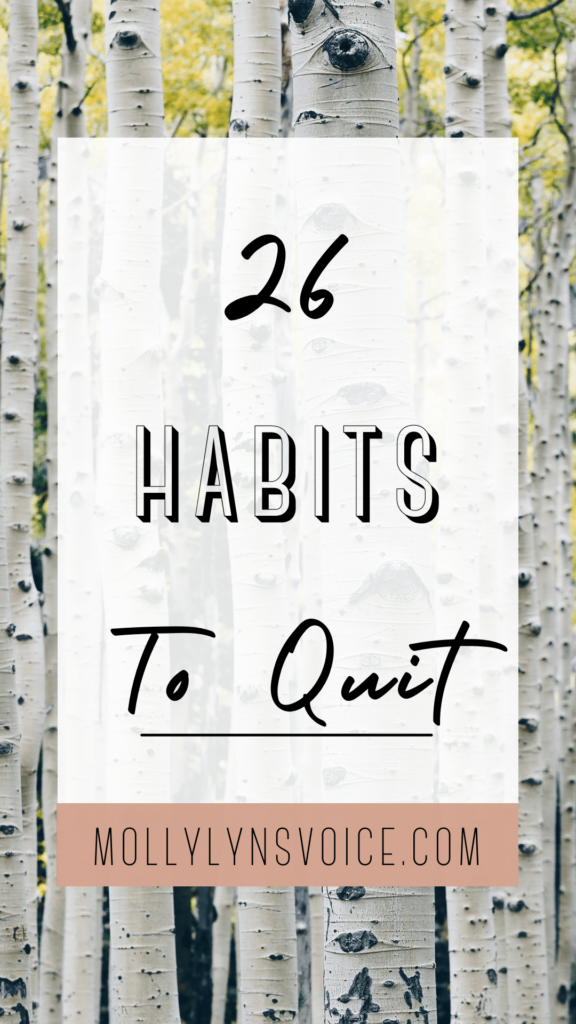
How Quitting Bad Habits Transforms Your Life Immediately
When I talk about “instantly” improving your life by quitting bad habits, I’m referring to the immediate impact on self-development. When you prioritize your well-being by eliminating harmful behaviors, you begin cultivating a confident relationship with yourself. I can personally attest to this transformation.
In the past, I frequently made promises to myself that I wouldn’t keep, creating a cycle of self-disappointment. This pattern was particularly damaging because:
- I lost trust in myself with each broken commitment
- I damaged relationships when others noticed my pattern of unfulfilled promises
- My self-confidence and self-love steadily declined
This negative cycle created a foundation of distrust—I couldn’t trust myself, and others couldn’t trust me either. What a devastating way to undermine your self-worth and confidence. It was time for me to work on becoming someone of integrity, someone I was proud to be.
Breaking the Cycle: Identifying Your Harmful Patterns
The first step toward lasting change isn’t adopting new positive habits—it’s honestly examining the negative ones holding you back. By understanding the triggers, emotional payoffs, and underlying causes of your bad habits, you create the self-awareness necessary for genuine transformation.
When you commit to addressing these root causes, you don’t just eliminate the negative behavior—you heal the underlying need that created it in the first place.
Building Self-Trust Through Habit Change
The journey of quitting bad habits rebuilds your relationship with yourself one small victory at a time. Each day you follow through on your commitment to change, you deposit a little more trust into your self-relationship account.
Over time, this consistent follow-through creates a powerful foundation of self-respect that naturally extends to other areas of your life. Making the best decisions for your future becomes more and more natural.
Here they are:
26 Habits to Quit for a Better Life Instantly
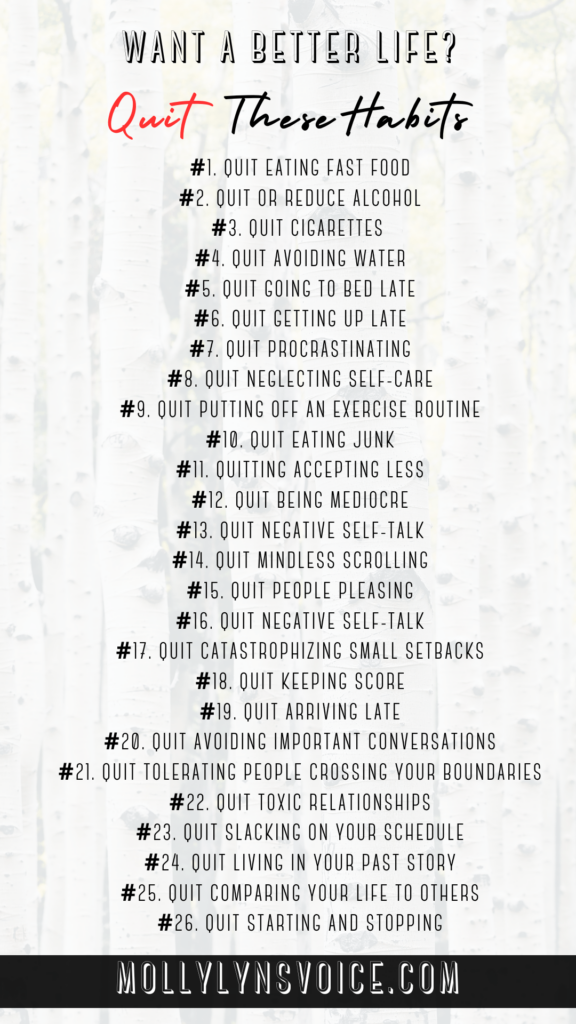
Here are the 26 Habits to Quit & Why
#1. Quit Eating Fast Food
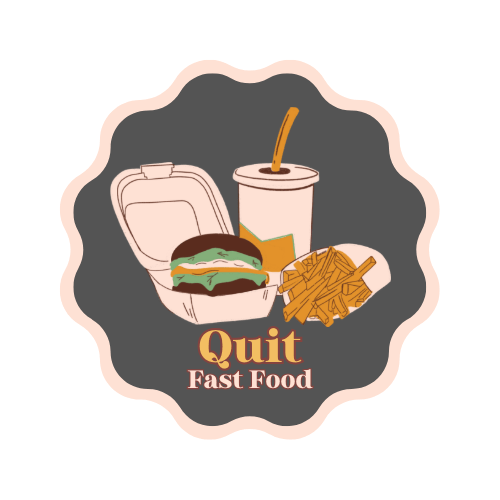
Quitting fast food can change your life for the better in several crucial ways:
Physical Health Benefits:
- Improved energy levels as your body receives more nutrient-dense foods
- Better weight management from reduced calorie, fat, and sodium intake
- Decreased risk of chronic conditions like heart disease, type 2 diabetes, and hypertension
- Clearer skin as you reduce intake of processed ingredients and inflammatory foods
- Better digestive health from increased fiber and reduced artificial ingredients
Mental and Emotional Improvements:
- Enhanced mood stability from steadier blood sugar levels
- Increased mental clarity and focus from better nutrition
- Greater self-confidence from making consistent healthy choices
- Reduced anxiety related to unhealthy eating patterns
- Better sleep quality from improved nutrition
Practical Advantages:
- Financial savings (home-prepared meals are typically more economical)
- Development of cooking skills and food knowledge
- More mindful eating habits and connection to your food
- Setting a positive example for friends and family
- Discovering new flavors and foods you enjoy
Many people report noticing tangible benefits within just 1-2 weeks of reducing fast food consumption. You don’t need to quit completely at once – even gradually reducing frequency can lead to significant improvements in how you feel.
#2. Quit or Reduce Alcohol

Quitting alcohol can create profound positive changes in many aspects of your life:
Physical Health Benefits:
- Improved sleep quality and patterns
- Enhanced immune system function
- Better liver health and function
- Reduced inflammation throughout your body
- Lower blood pressure and reduced heart disease risk
- Weight management becomes easier
- Clearer skin and reduced facial puffiness
- More stable blood sugar levels
Mental & Emotional Improvements:
- Greater mental clarity and sharper cognitive function
- Reduced anxiety and more stable mood
- Improved ability to manage stress effectively
- Better memory formation and retention
- Reduced risk of depression
- More consistent energy levels throughout the day
- Greater sense of emotional resilience
Practical Life Changes:
- More productive mornings without hangovers
- Financial savings (alcohol expenses add up quickly)
- More authentic social connections
- More free time that was previously spent drinking or recovering
- Improved performance at work or school
- Better decision-making in all areas of life
- Potential improvements in relationships
Many people notice some benefits within days (better sleep, more energy), while other improvements continue to develop over weeks and months. The psychological freedom from dependency and the pride in making a positive change are also significant benefits many former drinkers report. Not to mention the thousands of dollars you will save!
#3. Quit Cigarettes
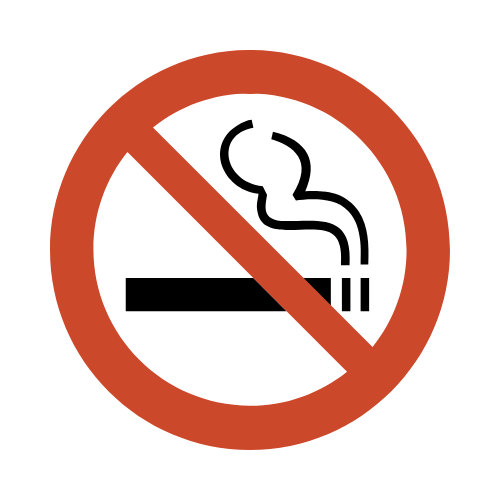
Quitting cigarettes can improve your life in numerous significant ways:
Health Benefits (Short-term):
- Within 20 minutes: Your heart rate and blood pressure drop
- Within 12 hours: Carbon monoxide levels in your blood return to normal
- Within 2 weeks to 3 months: Your circulation improves and lung function increases
- Within 1 to 9 months: Coughing and shortness of breath decrease; lungs begin to clear
- Improved sense of taste and smell
- Better dental health with reduced staining and fresher breath
Health Benefits (Long-term):
- Significantly reduced risk of lung cancer, heart disease, stroke, and respiratory diseases
- Decreased risk of many other cancers (bladder, esophageal, kidney, etc.)
- Lower risk of diabetes and improved control if you have diabetes
- Stronger immune system
- Reduced risk of osteoporosis and improved bone health
- Longer life expectancy (quitting at age 30 adds nearly 10 years to life expectancy)
Quality of Life Improvements:
- More energy for daily activities and exercise
- Elimination of smoker’s cough and respiratory infections
- No more smoke odor on your clothes, hair, home, and car
- Freedom from planning activities around smoking breaks
- Relief from the stress of hiding smoking or finding places to smoke
- Better endurance and physical performance
Financial Benefits:
- Immediate savings from not buying cigarettes (often thousands per year)
- Lower health insurance premiums
- Reduced healthcare costs over time
- Less money spent on breath fresheners, teeth whitening, etc.
Social and Emotional Benefits:
- Reduced anxiety and depression (despite the common misconception that smoking relieves stress)
- Increased self-confidence from overcoming addiction
- Setting a positive example for others, especially children
- Freedom from stigma associated with smoking
- Improved relationships with non-smoking friends and family
Many former smokers report that the psychological freedom from addiction is one of the most rewarding aspects of quitting, along with the pride that comes from overcoming such a challenging habit.
#4. Quit Avoiding Water

Increasing your water intake after avoiding it can lead to remarkable health benefits in your daily life:
Physical Benefits:
- More consistent energy levels throughout the day
- Reduction in headaches, which are often caused by dehydration
- Improved digestion and reduced constipation
- Better kidney function and reduced risk of kidney stones
- Clearer, more hydrated skin with improved elasticity
- Reduced joint pain as cartilage stays better lubricated
- Improved exercise performance and recovery
- Better temperature regulation, especially in hot weather
Cognitive Improvements:
- Enhanced mental clarity and focus
- Improved concentration during tasks
- Better mood stability and reduced irritability
- Potential reduction in brain fog
Daily Quality of Life:
- Reduced feelings of fatigue and lethargy
- Better mouth health and fresher breath
- Less intense hunger (thirst is often mistaken for hunger)
- Improved sleep quality
- Fewer muscle cramps, particularly at night
- Stronger immune system response
Long-term Health Benefits:
- Better cardiovascular health as proper hydration supports heart function
- Reduced risk of certain types of cancer
- Support for healthy weight management
- Better blood pressure regulation
- Improved blood oxygen circulation
Many people notice some benefits like increased energy and reduced headaches within just 1-2 days of proper hydration. Other benefits develop more gradually as your body adjusts to having adequate water consistently.
The transition to drinking more water is one of the simplest yet most impactful health changes you can make, with benefits that affect virtually every system in your body.
#5. Quit Going to Bed Late
Establishing an earlier bedtime can create remarkable improvements in many aspects of your life:
Physical Benefits:
- More complete sleep cycles, enhancing overall sleep quality
- Better hormone regulation (including growth hormone and cortisol)
- Improved immune system function
- Increased physical energy throughout the day
- Better appetite regulation and metabolism
- Reduced inflammation throughout the body
- Lower risk of cardiovascular issues linked to sleep deprivation
Mental and Cognitive Advantages:
- Enhanced focus and concentration during the day
- Improved memory formation and retention
- Better emotional regulation and stress management
- Reduced anxiety and depressive symptoms
- Sharper decision-making abilities
- Greater creativity and problem-solving skills
- More stable mood throughout the day
Productivity and Performance:
- More productive morning hours when many people do their best work
- Reduced procrastination and improved time management
- Better performance at work or school
- More consistent energy for exercise and physical activities
- Reduced reliance on caffeine and other stimulants
Quality of Life Improvements:
- More time to establish a relaxing evening routine
- Reduced feeling of always rushing or being behind
- Better alignment with natural circadian rhythms
- More predictable daily schedule
- Opportunity to enjoy peaceful morning hours
- Potential for more quality time with early-rising family members
Many people report noticeable benefits within just a few days of shifting to an earlier, consistent bedtime. The cumulative effects of quality sleep become even more significant over weeks and months, potentially transforming your overall well-being and daily experience.
#6. Quit Getting Up Late
Waking up earlier can transform your daily life in numerous positive ways:
Morning Advantages:
- Gain peaceful, uninterrupted time for yourself before daily demands begin
- Enjoy a relaxed morning routine instead of rushing
- Have time for a proper breakfast, improving nutrition and metabolism
- Reduced morning stress and anxiety from not hurrying
- Time for exercise when willpower is typically strongest
- Opportunity for thoughtful planning of your day
Productivity Benefits:
- Access to your peak cognitive hours when your mind is freshest
- More uninterrupted focus time before meetings and communications begin
- Improved consistency in daily routines
- Potential for completing important tasks before most people start their day
- Better alignment with business hours for appointments and services
- More daylight hours at your disposal
Physical and Mental Wellbeing:
- Better alignment with your natural circadian rhythms
- Increased exposure to morning sunlight, improving mood and vitamin D production
- More consistent sleep-wake cycles, improving overall sleep quality
- Reduced likelihood of sleep inertia (that groggy feeling from waking rushed)
- Often leads to earlier bedtimes, creating healthier sleep patterns
- Enhanced mental clarity and alertness throughout the day
Lifestyle Improvements:
- More time to enjoy daylight, especially in winter months
- Opportunities for morning activities like watching the sunrise
- Sense of accomplishment early in the day that carries forward
- Potential for more family time in the mornings
- Less likely to miss appointments or be late for commitments
- Greater sense of control over your day rather than the day controlling you
Many early risers report that the morning hours feel like “bonus time” – productive, peaceful hours they never experienced when sleeping in. Even shifting your wake time by 30-60 minutes earlier can create noticeable improvements in your daily experience.
#7. Quit Procrastinating
Overcoming procrastination can transform your life in powerful ways:
Reduced Stress and Anxiety:
- Eliminate the constant weight of unfinished tasks hanging over you
- Free yourself from last-minute panic and rushed work
- Experience the relief of having buffer time for unexpected challenges
- Enjoy the peace of mind that comes with staying ahead of deadlines
Improved Work Quality:
- Give yourself time for revision and refinement
- Incorporate feedback and make improvements
- Apply your best thinking rather than rushed efforts
- Complete work you can genuinely be proud of
Enhanced Productivity:
- Accomplish more with the same amount of time
- Build momentum that makes starting new tasks easier
- Break large projects into manageable pieces
- Experience the satisfaction of steady progress
Better Relationships:
- Become known as reliable and dependable
- Reduce conflicts caused by missed deadlines or commitments
- Have more energy for meaningful connections when not stressed by procrastination
- Be more present with others instead of worried about postponed tasks
Personal Growth:
- Develop stronger self-discipline that benefits all areas of life
- Build genuine confidence from consistently meeting commitments
- Experience increased self-respect and trust in yourself
- Create a positive cycle of achievement and motivation
Time Freedom:
- Create genuine leisure time unmarred by guilt or anxiety
- Enjoy breaks without the shadow of unfinished work
- Have more control over your schedule
- Experience life with greater presence rather than constant worry about what’s not done
The shift away from procrastination often starts small but creates a snowball effect of positive changes that can ultimately transform your relationship with time, work, and yourself.
#8. Quit Neglecting Self-Care
Prioritizing self-care can transform your life in profound ways:
Physical Wellbeing:
- Increased energy and vitality for daily activities
- Better sleep quality and more consistent rest
- Stronger immune system and fewer illnesses
- Improved physical appearance reflecting inner health
- Better management of existing health conditions
- Reduced physical tension and pain
- More stable weight and improved nutrition
Mental and Emotional Health:
- Significant reduction in stress and anxiety levels
- Greater emotional resilience during challenging times
- Improved mood stability throughout the day
- Enhanced ability to process difficult emotions
- Sharper focus and mental clarity
- Better memory and cognitive function
- Reduced risk of burnout and mental exhaustion
Relationships and Social Life:
- More authentic connections with others from a place of fullness rather than depletion
- Clearer boundaries that protect your wellbeing
- Better communication when you’re not stressed or exhausted
- More patience and presence with loved ones
- Modeling healthy behavior for others, especially children
- Greater capacity for empathy and compassion
Work and Productivity:
- Improved concentration and problem-solving abilities
- More consistent performance without dramatic ups and downs
- Enhanced creativity and innovative thinking
- Better work-life balance and integration
- Reduced absenteeism from preventable illness
- Improved decision-making from a clearer state of mind
- Greater career longevity without burnout
Personal Growth:
- Stronger sense of self-worth and self-respect
- Better understanding of your needs and values
- Greater self-awareness and emotional intelligence
- More intentional life choices aligned with your authentic self
- Increased capacity for gratitude and appreciation
- Deeper connection to personal purpose and meaning
When you prioritize self-care, you’re not being selfish—you’re ensuring you have the resources to show up fully in all areas of your life. The benefits ripple outward, affecting everything from your health to your relationships to your work performance.
#9. Quit Putting Off an Exercise Routine
Establishing a consistent exercise routine can transform your life in numerous meaningful ways:
Physical Benefits:
- Increased energy throughout the day
- Improved strength and endurance for daily activities
- Better cardiovascular health and reduced disease risk
- Enhanced flexibility and reduced stiffness
- Better posture and reduced back pain
- Improved sleep quality and easier time falling asleep
- Stronger immune system function
- Better weight management
Mental and Emotional Advantages:
- Natural release of mood-enhancing endorphins
- Reduced anxiety and depression symptoms
- Better stress management capabilities
- Improved mental clarity and focus
- Enhanced self-confidence and body image
- Sense of accomplishment and self-discipline
- Reduced brain fog and sharper thinking
- Natural anxiety relief without medication
Long-term Benefits:
- Increased lifespan and healthier aging
- Better bone density reducing osteoporosis risk
- Maintained muscle mass as you age
- Improved balance reducing fall risk
- Better insulin sensitivity and metabolic health
- Lower blood pressure and cholesterol levels
- Reduced risk of many chronic diseases
- Potentially slowed cognitive decline
Daily Life Improvements:
- More energy for activities you enjoy
- Increased productivity at work
- Better resilience during challenging times
- Improved mood around family and friends
- Enhanced quality of life through physical capability
- More confidence in your physical abilities
- Better medical checkups and health markers
- Potential for new social connections through exercise
Many people find that the benefits of regular exercise extend far beyond the physical – it often becomes a cornerstone habit that positively influences sleep, nutrition, stress management, and overall well-being.
#10. Quit Eating Junk
Eliminating junk food from your diet can transform your life in numerous meaningful ways:
Physical Health Benefits:
- Increased energy levels throughout the day
- More stable blood sugar, avoiding energy crashes
- Improved digestion and gut health
- Better weight management
- Clearer skin and improved complexion
- Reduced inflammation throughout your body
- Better dental health with fewer cavities
- Improved immune system function
- Reduced risk of chronic diseases like diabetes and heart disease
Mental Clarity and Emotional Well-being:
- Enhanced cognitive function and mental clarity
- Better mood stability without sugar crashes
- Reduced symptoms of anxiety and depression
- Improved concentration and focus
- Better memory formation and recall
- Reduced brain fog after meals
- Greater emotional resilience
- Improved sleep quality
Practical Life Benefits:
- Money saved from expensive packaged foods
- Developing cooking skills and food knowledge
- Greater appreciation for natural flavors
- More enjoyable relationship with food
- Setting positive examples for others
- Reduced dependency on highly processed foods
- Discovering new, nutritious foods you enjoy
- More consistent energy for activities you love
Many people report noticeable improvements within just 1-2 weeks of reducing junk food, including better energy, improved sleep, and reduced cravings. The cumulative benefits continue to develop over months, often resulting in significant improvements in overall health and wellbeing.
#11. Quitting Accepting Less
Refusing to accept less than you deserve can transform your life in profound ways:
Self-Worth and Confidence:
- Developing deeper self-respect and recognition of your true value
- Growing confidence that comes from honoring your own standards
- Breaking cycles of self-doubt and negative self-talk
- Creating a more authentic relationship with yourself
- Building trust in your own judgment and intuition
Relationships:
- Attracting partners and friends who value and respect you
- Establishing healthier relationship dynamics from the start
- Experiencing more balanced give-and-take in connections
- Reducing resentment that builds when your needs aren’t met
- Creating space for truly supportive and nurturing relationships
- Eliminating toxic or one-sided connections that drain your energy
Professional Growth:
- Receiving fair compensation and recognition for your work
- Being assigned projects that match your abilities
- Having your ideas and contributions taken seriously
- Advancement opportunities that reflect your true capabilities
- Working environments that respect your boundaries and time
- Building a reputation as someone who knows their value
Personal Growth:
- Setting meaningful goals aligned with your true potential
- Pushing yourself to grow beyond comfortable limitations
- Discovering capacities you didn’t know you possessed
- Creating a life that reflects your authentic desires
- Taking risks that align with your real worth
- Experiencing the fulfillment of living up to your potential
The journey of refusing to accept less creates an upward spiral – each time you honor your worth, you strengthen your ability to recognize and demand what you truly deserve in all areas of life.
#12. Quit Being Mediocre
When you reject mediocrity and pursue excellence, you transform not just your external circumstances but your entire relationship with yourself and the world around you.
The most immediate change happens internally – you develop genuine self-respect based on your actions rather than just intentions. This creates a foundation of confidence that influences everything you do. You’ll experience the deep satisfaction that comes only from knowing you’ve given your absolute best.
Professionally, excellence gets noticed. Doors open that remain closed to average performers. You’ll find yourself invited into opportunities, projects, and roles that were previously inaccessible. Excellence naturally differentiates you in competitive environments.
Your relationships transform as well. You begin attracting others who share your commitment to excellence, creating connections with greater depth and mutual growth. Your standards silently challenge those around you to reconsider their own approach to life and work.
Perhaps most importantly, rejecting mediocrity changes how you experience life itself. Activities become more engaging, time more valuable, and achievements more meaningful. You develop a heightened presence that makes even ordinary moments more vivid and satisfying.
#13. Quit Negative Self-talk
Eliminating negative self-talk can create profound positive changes in virtually every aspect of your life.
Mentally and emotionally, you’ll likely experience significant relief as you remove a primary source of anxiety and depression. Many people report feeling like a weight has been lifted when they stop the constant internal criticism. Your natural resilience emerges when you’re not undermining yourself, making challenges more manageable.
Your performance improves noticeably as well. Without the drain of self-doubt and criticism, you can direct more mental energy toward your goals. You become more willing to take risks and try new things when you’re not anticipating failure. Many people discover abilities they didn’t know they had when they silence the critical inner voice.
Relationships transform too. As you treat yourself with more compassion, you naturally expect better treatment from others. You’ll likely find yourself setting healthier boundaries and engaging in more authentic connections. The voice you use with yourself becomes the foundation for how you communicate with others.
Even your physical health benefits. Sleep often improves when rumination decreases, and many stress-related physical symptoms diminish. You become more likely to engage in consistent self-care when you value yourself more highly.
The journey to eliminate negative self-talk isn’t always easy, but the comprehensive benefits make it one of the most impactful changes you can make for your overall wellbeing.
#14. Quit Mindless Scrolling
Mindless scrolling through social media and content feeds has become a default mode for many of us, but breaking this habit can significantly improve your quality of life. Here are some strategies to help you quit this habit:
Understand Your Triggers
- Notice when you automatically reach for your phone
- Identify emotional states (boredom, anxiety, loneliness) that prompt scrolling
- Track your usage patterns to recognize peak scrolling times
Create Friction
- Delete social media apps from your home screen
- Use app timers or blockers (like Freedom, AppBlock, or Screen Time)
- Keep your phone in another room during focused work or rest times
- Enable grayscale mode to make your screen less visually appealing
Replace With Meaningful Alternatives
- Keep a physical book nearby
- Prepare a list of quick, meaningful activities (stretching, journaling, meditation)
- Develop a hobby that requires using your hands
- Call a friend instead of checking social feeds
Be Intentional
- Ask “what am I seeking right now?” before unlocking your phone
- Set specific purposes for technology use
- Practice mindful technology use – be present with what you’re consuming
Would you like more specific suggestions for any of these strategies, or are there particular situations where you find mindless scrolling most challenging?
#15. Quit People Pleasing
Letting go of people-pleasing can create profound positive changes throughout your life.
You’ll reclaim your most precious resources—your time and energy. Instead of constantly draining yourself to meet others’ expectations, you can direct these resources toward what truly matters to you. Many former people-pleasers describe this as feeling like they can finally breathe again after years of living under constant pressure.
Your relationships will transform in meaningful ways. While you might worry that people will reject you when you stop accommodating their every need, the opposite typically happens—healthy relationships actually improve with honest boundaries. You’ll gradually find yourself surrounded by people who respect your limits and offer genuine reciprocity rather than just taking from you.
Emotionally, you’ll experience remarkable freedom. The constant anxiety about others’ approval diminishes, often dramatically. The resentment that builds when you repeatedly override your own needs begins to dissolve. In its place, you’ll develop authentic pride in honoring your true self rather than seeking external validation.
Professionally, setting appropriate boundaries often leads to greater respect and recognition. You become known for clear communication and reasonable limits rather than being the person everyone takes advantage of. These qualities frequently lead to better opportunities and advancement.
Perhaps most importantly, you’ll reconnect with your authentic self. Many people who break free from people-pleasing describe discovering aspects of themselves they’d lost touch with years ago. This self-connection becomes the foundation for building a life aligned with your genuine values and desires.
#16. Quit Oversharing
If you find yourself constantly oversharing, it might be time to consider whether quitting this habit could enhance your life. Oversharing often leads to feelings of vulnerability and anxiety, as personal information shared can come back to haunt you in unexpected ways. By choosing to quit this bad habit, you can reclaim your privacy and foster deeper connections with those who truly matter.
Imagine the relief of not feeling the need to divulge every detail of your life. This shift allows you to curate your narrative and maintain a sense of mystery that can strengthen relationships rather than dilute them. Quitting oversharing can also lead to greater self-awareness; you’ll start reflecting on what truly matters in conversations instead of defaulting to personal anecdotes.
Ultimately, letting go of the urge to overshare could pave the way for a more fulfilling life—one where boundaries are respected, and meaningful exchanges take precedence over superficial chatter. Embrace this change, and watch how it transforms not just your interactions but also your overall well-being.
#17. Quit catastrophizing small setbacks
If you find yourself often catastrophizing small setbacks, the question arises: will quitting this bad habit truly make your life better? The answer is a resounding yes. By letting go of the tendency to magnify minor issues into major crises, you open the door to a more balanced and fulfilling existence.
Catastrophizing can cloud your judgment and lead to unnecessary stress. Each time you blow a small setback out of proportion, you not only drain your emotional energy but also hinder your ability to think clearly and make rational decisions. Imagine how liberating it would feel to face challenges with a calm mind instead of succumbing to panic.
Quitting this detrimental habit allows for greater resilience. You’ll begin to view obstacles as opportunities for growth rather than insurmountable barriers. This shift in perspective can lead to improved mental health, enhanced relationships, and increased productivity. Life will inevitably throw curveballs your way; however, by reframing how you respond to them, you’ll cultivate a mindset that thrives on positivity rather than fear.
In short, breaking free from the cycle of catastrophizing is not just about reducing anxiety—it’s about reclaiming control over your life and paving the way for personal growth and happiness. So why not take that first step today? Your future self will thank you for it.
#18. Quit Keeping Score
If you’ve ever found yourself obsessively keeping score in your relationships or daily interactions, it might be time to consider the benefits of quitting this bad habit. Let’s face it: constantly tallying up who did what can create an atmosphere of competition rather than cooperation. It fosters resentment and can lead to unnecessary conflicts that drain your energy and joy.
Imagine a life free from the burden of scorekeeping. When you quit this habit, you open the door to deeper connections and more authentic experiences. Instead of focusing on what others owe you or how many favors you’ve done, you start to appreciate the moments shared without strings attached. This shift not only enhances your relationships but also cultivates a sense of peace within yourself.
By letting go of the need to keep score, you’re choosing a path toward emotional freedom and personal growth. You’ll find that life becomes more enjoyable when you focus on gratitude rather than grievances. So ask yourself: are you ready to quit this bad habit for good? The potential for a happier, more fulfilling life awaits those who dare to embrace it.
#19. Quit Arriving Late
If you’re contemplating whether quitting the habit of arriving late could enhance your life, the answer is a resounding yes. Breaking this bad habit can lead to a cascade of positive changes that ripple through various aspects of your daily routine.
Imagine starting your day without the frantic rush and stress that often accompanies tardiness. By committing to punctuality, you create a sense of order and control in your life. Arriving on time not only shows respect for others but also reflects positively on your personal brand, whether at work or in social settings.
Moreover, quitting this bad habit allows you to reclaim precious time—time that can be spent enjoying a leisurely morning coffee or preparing for important meetings with clarity and focus. You’ll find that being punctual opens doors to new opportunities, fosters better relationships, and enhances overall productivity.
In essence, leaving behind the habit of arriving late is not just about being on time; it’s about embracing a lifestyle that prioritizes respect, organization, and personal growth. So why wait? Take the first step towards a more fulfilling life by committing to punctuality today!
#20. Quit Avoiding Important Conversations
If you’re contemplating whether to quit avoiding important conversations, the answer is a resounding yes—it will undoubtedly make your life better. Avoiding these crucial discussions often leads to unresolved issues, lingering resentment, and a cycle of anxiety that can weigh heavily on your mental health. By facing these conversations head-on, you not only free yourself from the burden of avoidance but also open the door to clarity and understanding.
Think about it: every time you sidestep an important conversation, you’re reinforcing a bad habit that stifles personal growth and hinders relationships. Quitting this habit allows for authentic connections with others and fosters an environment of honesty and transparency. You’ll find that addressing issues directly can lead to resolutions you never thought possible, paving the way for more meaningful interactions.
Moreover, having difficult conversations equips you with valuable skills—like conflict resolution and effective communication—that are essential in both personal and professional realms. So why continue to let fear dictate your actions? Embracing these discussions can transform your life into one filled with deeper connections and greater emotional freedom. Take the leap; quit avoiding important conversations today!
#21. Quit Tolerating People Crossing Your Boundaries
If you’ve ever found yourself feeling drained or frustrated by others constantly crossing your boundaries, it’s time to consider the profound impact of quitting this bad habit of tolerance. Imagine a life where your needs are respected, and your personal space is honored. By choosing to stop tolerating behavior that undermines your well-being, you’re not just setting limits; you’re reclaiming your power.
When you quit allowing others to overstep their bounds, you create a healthier environment for yourself. This shift can lead to improved relationships built on mutual respect rather than resentment. You’ll find that asserting your boundaries fosters deeper connections with those who truly value and understand you.
Moreover, prioritizing your own well-being enhances your mental health. No longer will you feel the weight of constant compromise or the anxiety of unspoken frustrations. Instead, you’ll experience a newfound sense of freedom and clarity in both personal and professional settings.
So ask yourself: if I quit tolerating people crossing my boundaries, will it make my life better? The answer is a resounding yes! Embrace this change for a more fulfilling and empowered existence.
#22. Quit Toxic Relationships
If you’ve been contemplating whether to quit toxic relationships, the answer is a resounding yes—doing so can significantly enhance your life. Toxic relationships drain your energy, undermine your self-esteem, and create an environment of negativity that can be hard to escape. By choosing to let go of these harmful connections, you are essentially quitting a bad habit that has likely held you back for far too long.
Imagine waking up each day free from the weight of drama, manipulation, or constant criticism. Quitting toxic relationships allows you to reclaim your time and emotional well-being. You’ll find yourself more open to positive experiences and healthier interactions, paving the way for personal growth and happiness.
It’s important to recognize that breaking free from toxic dynamics might be challenging initially; however, the long-term benefits are undeniable. You will cultivate healthier habits in all aspects of your life—from friendships to professional relationships—leading to a more fulfilling existence overall. So take that courageous step today: prioritize yourself by quitting what no longer serves you. Your future self will thank you!
#23. Quit Slacking on Your Schedule
If you Quit slacking on your schedule it can indeed lead to a better life. When you commit to a structured routine, you create a sense of discipline that can enhance productivity and reduce stress. By managing your time more effectively, you’ll find that you have more opportunities to accomplish your goals, whether they are personal or professional.
Establishing a consistent schedule allows you to prioritize tasks, making it easier to tackle important projects without feeling overwhelmed. This can lead to a greater sense of achievement and fulfillment in your daily life.
Additionally, sticking to a schedule can improve your work-life balance, giving you dedicated time for relaxation and self-care, which is essential for overall well-being. Moreover, reducing procrastination can boost your confidence. As you start to meet deadlines and complete tasks on time, you’ll likely feel more in control and less anxious about your responsibilities. This newfound confidence can spill over into other areas of your life, encouraging you to take on new challenges and pursue your passions.
Ultimately, by committing to your schedule and eliminating distractions, you can create a more organized and fulfilling lifestyle. You’ll have the time and energy to invest in relationships, hobbies, and self-improvement, all of which contribute to a happier and more successful life.
#24. Quit Living in Your Past Story
Quitting living in your past story can indeed lead to a better life. When you hold onto past experiences, especially negative ones, they can weigh you down and create barriers to personal growth. By letting go of these narratives, you allow yourself the opportunity to embrace the present and explore new possibilities.
Living in the past often leads to feelings of regret, sadness, or resentment, which can cloud your perception of the present. By shifting your focus away from what has been and concentrating on the here and now, you open yourself up to new experiences and relationships. This shift can foster a sense of peace and fulfillment, as you learn to appreciate life as it unfolds.
It’s important to acknowledge your past and the lessons it has taught you, but it’s equally vital to not let it define your future. Engaging in practices such as mindfulness, therapy, or journaling can help you process these experiences and move forward. By doing so, you create space for healing and personal development, allowing you to live a more authentic and joyful life.
Ultimately, letting go of your past story doesn’t mean forgetting it; instead, it means choosing to prioritize your present and future. This decision can lead to greater happiness, improved relationships, and a renewed sense of purpose. Embracing the present can transform your life in ways you never imagined.
#25. Quit Comparing Your Life to Others
Comparing our lives to others can often lead to feelings of inadequacy, jealousy, and unhappiness. When you stop this habit, you may find a newfound sense of clarity and contentment. Instead of focusing on what others have or achieve, you can shift your attention to your own journey, values, and goals.
Living a better life often starts with self-acceptance and gratitude for what you have. By recognizing your unique path and celebrating your achievements, no matter how small, you cultivate a positive mindset. This shift not only enhances your mental well-being but also encourages personal growth.
Additionally, embracing your individuality allows you to appreciate the differences that make life interesting. Instead of competing, you can find inspiration in others’ successes while remaining focused on your own aspirations. Ultimately, if you quit comparing your life to others, you may discover a deeper sense of fulfillment and happiness in living authentically.
#26. Quit Starting and Stopping
Quitting the cycle of starting and stopping can no doubt lead to a more fulfilling life. When you consistently begin new endeavors only to abandon them, it can create feelings of frustration and inadequacy along with self-doubt, and loss of trust in yourself. This pattern often prevents you from achieving your goals and experiencing the satisfaction that comes with seeing projects through to completion. By committing to persistence and consistency, you open yourself up to growth and improvement. It fosters a sense of discipline that can enhance your self-esteem and motivation.
When you focus on completing what you start, you not only build skills and knowledge but also cultivate resilience. Over time, this approach can lead to a more stable and satisfying life, as you begin to see tangible results from your efforts. Additionally, breaking the habit of starting and stopping helps to minimize the stress and anxiety that often accompany unfinished tasks. It allows you to concentrate your energy on one pursuit at a time, making it easier to enjoy the journey rather than feeling overwhelmed by multiple unfinished projects.
Sometimes we just have to face the obstacle head on and even if it feels impossible do it anyway!
Philippians 4:13 “I can do all things through Christ who strengthens me”.
Ultimately, choosing to quit the cycle of starting and stopping can lead to greater clarity, purpose, and a sense of achievement, making your life indeed better in many ways.
Final Thought: 26 Habits to Quit for a Better Life Instantly
Quitting bad habits can significantly impact your ability to change and adopt new good habits.
When you let go of behaviors that are detrimental to your health, productivity, or well-being, you create mental and emotional space that can be filled with positive actions and routines. For instance, if you stop procrastinating, you free up time and energy that can be redirected toward activities that promote personal growth, such as exercising, reading, or pursuing a new hobby. This shift not only enhances your daily life but also boosts your self-discipline and motivation.
Breaking free from harmful habits often leads to increased self-awareness. This awareness can help you identify triggers that lead to negative behaviors, allowing you to develop strategies to counteract them. By understanding your habits, you can implement new, healthier practices that align with your goals.
In essence, quitting bad habits creates a positive domino effect: as you eliminate what holds you back, you empower yourself to make choices that foster a positive and fulfilling lifestyle. Replacing detrimental behaviors with constructive ones leads to a more balanced and rewarding life!
Birch Trees
-my favorite tree
In case anyone is curious about the birch trees, I grew up around lots of birch trees. When I was a kid I was and still am obsessed with meanings of things. I love to know what everything symbolizes. God has purpose in all His creation.
Meaning of Birch Trees
In many cultures, the birch tree symbolizes renewal, purification, and new beginnings, often associated with spring and the feminine aspects of nature.
Romans 12:2 “Do not be conformed to this world, but be transformed by the renewing of your mind, that by testing you may discern what is the good, pleasing, and perfect will of God.” This passage highlights how crucial it is to transform our mindset and adopt God’s viewpoint instead of our own.Through the renewal of our thinking through the word of God, we can escape the cycle of harmful habits and cultivate fresh habits that bring honor to God.
If you feel comfortable share below in the comments what habits you are quitting!!

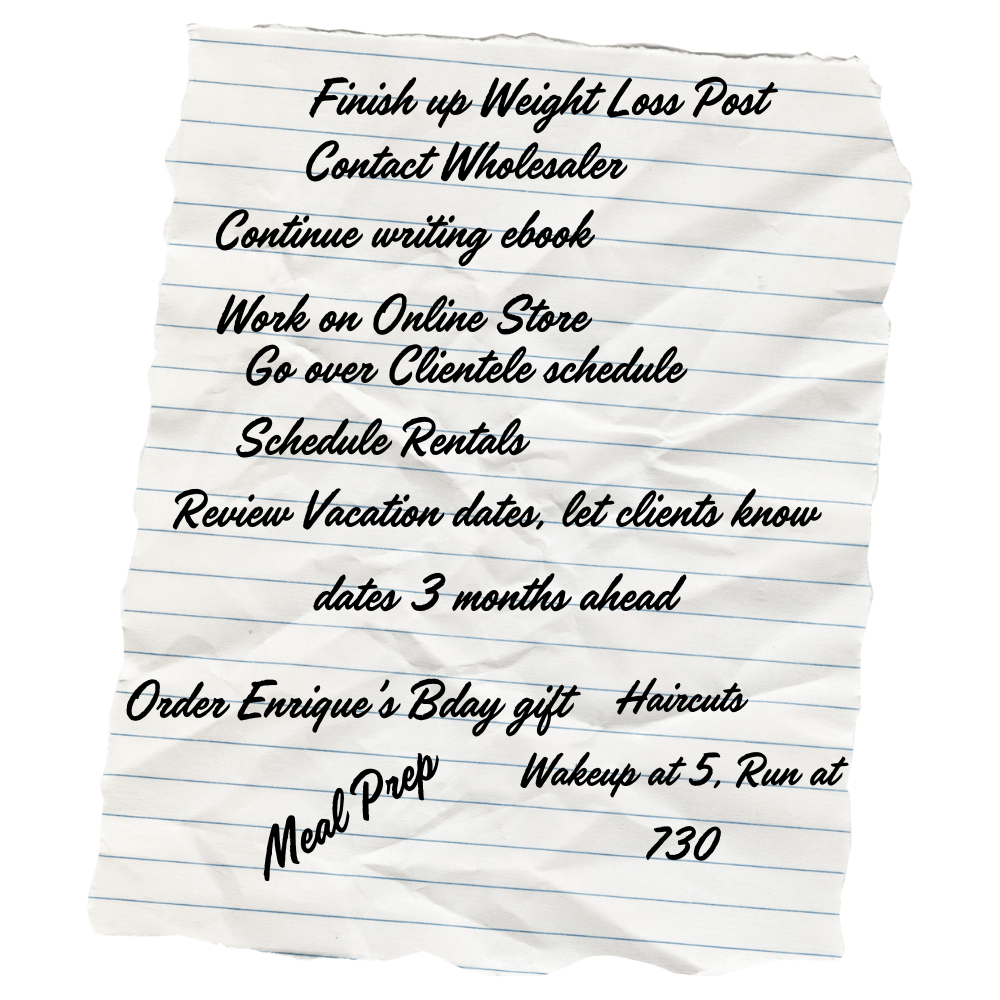
How to Brain Dump and Prioritize it On Your Calendar
I was searching for ways to get more schedule-oriented and take control of my calendar when I discovered brain dumping—a simple yet powerful technique that helps you organize your thoughts, prioritize tasks, and input them into your schedule.
Believe me, I’ve struggled with calendar overwhelm for as long as I can remember. I would create a well-organized schedule, only to find myself buried under a pile of new tasks within days. But once I started using brain dumping, everything changed.
What Is Brain Dumping?
Brain dumping is the process of writing down everything that’s on your mind—tasks, ideas, reminders—onto paper or a digital note-taking app. Once your thoughts are out of your head, you can sort, prioritize, and schedule them effectively.
How Brain Dumping Transformed My Productivity
When I started brain dumping regularly, I noticed three major improvements:
* Reduced mental clutter – I no longer had to juggle dozens of thoughts in my head.
* Better task prioritization – I could clearly see what needed to be done first.
* Increased productivity – My focus improved because I wasn’t constantly overwhelmed.
Integrate The 3-Task Rule: A Game-Changer
One of the biggest lessons I learned came from Alex Hormozi, who emphasizes focusing on execution rather than getting lost in minor tasks. Inspired by his approach, I followed a system that helps me stay on track—the 3-Task Rule.
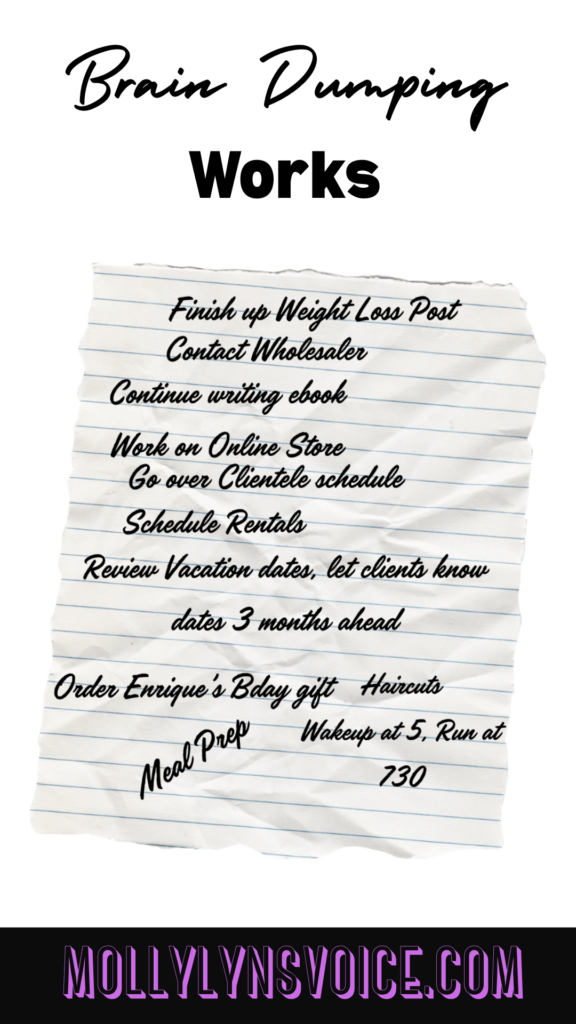
How It Works:
- Identify the 3 most important tasks you must complete each day.
- Tackle the highest-priority task first.
- Avoid wasting time on small, insignificant tasks until your top three are done.
By combining brain dumping with the 3-Task Rule, I’ve been able to manage my calendar more effectively and stay on top of my commitments without feeling overwhelmed.
How to Implement Brain Dumping in Your Routine
- Write Everything Down – Grab a notebook, notepad or open a notes app and list every task, idea, or thought cluttering your mind.
- Categorize & Prioritize – Sort tasks into categories (work, personal, errands, etc.), then highlight the most urgent and important ones.
- Schedule It – Transfer your priorities into your calendar, assigning time slots for execution.
- Follow the 3-Task Rule – Each day, focus on completing your top three tasks before anything else.
The act of brain dumping is essentially dumping all your thoughts and most urgent tasks on a piece of paper. Once it’s on the paper, now you can look over it. I think of it as being able to get outside my head and feel like I have more control. I analyze the paper and begin to write down
Brain dumping and transferring tasks to your calendar is a powerful way to clear mental clutter and get organized.
Pro Tip: Use the “3-Task Rule”—pick 3 key tasks per day to focus on for sustainable progress.
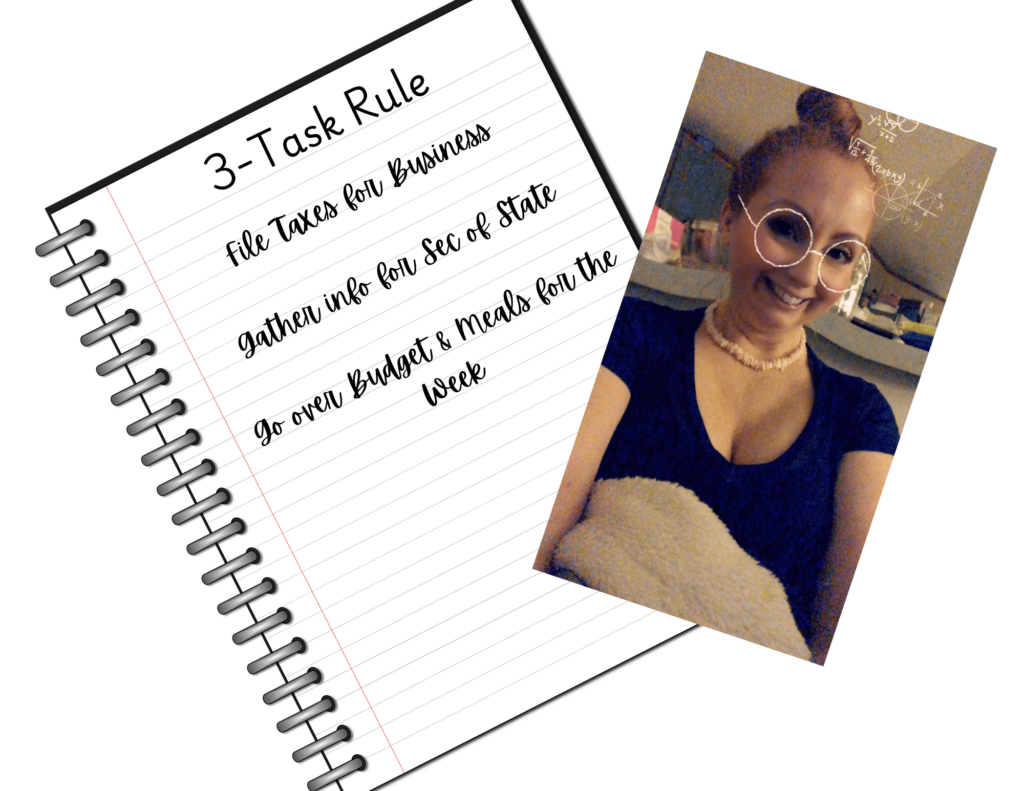
Here’s a structured Brain Dump & Calendar Input Outline you can follow:
Step 1: Brain Dump (Free Write)

Set a Timer (10-15 min) and write everything on your mind:

- Work tasks
- Personal to-dos
- Ideas & projects
- Errands & appointments
- Random thoughts or worries
Step 2: Categorize & Prioritize
A. Group Similar Items
- Work
- Personal
- Errands
- Ideas/Notes
- Miscellaneous
B. Highlight Priorities
- ⭐ Urgent (Must do today/tomorrow)
- ✅ Important (Schedule for the week)
- ❌ Not necessary (Delete or delegate)
Step 3: Schedule in Your Calendar
Use a simple structure for the day:
| Task | Category | Time Block | Reward |
|---|---|---|---|
| Work on Weight Loss Post | Work | 10:00 AM – 11:00 AM | Accomplished |
| File Business Taxes | Urgent | 2:00 PM – 3:00 PM | Check Off |
| Get Car Detailed | Errands | 3:00 PM – 5:00 PM | Clean Car |
Pro Tips:
✔ Use color coding for different categories.
✔ Stick to the 3-Task Rule per day.
✔ Leave buffer time between tasks for flexibility.
Brain dumping has been a lifesaver for me, helping me stay organized, productive, and stress-free. While no system is perfect, this method gives me a structured way to approach my daily tasks. If you’ve ever struggled with calendar overwhelm, I highly recommend giving it a try!

Summed Up
Brain Dumping and Prioritizing it on Your Calendar
To brain dump effectively, start by writing down everything on your mind—tasks, ideas, and priorities—onto paper or a digital note-taking app. Once everything is listed, categorize and prioritize your tasks by urgency and importance. Next, transfer the top priorities to your calendar, assigning specific time slots for each. Use the 3-Task Rule by focusing on the three most crucial tasks daily before tackling smaller ones. This method helps clear mental clutter, improve focus, and keep your schedule manageable while ensuring important tasks get done efficiently.
Do you Brain Dump?
Do you have a great tip to share or a question?
Comment Below
You might also be interested in: Ultimate Dopamine Cleaning Checklist : Make Housework Fun & Productive!


How to Find Your Kingdom Husband
Welcome! What Does It Mean to Find Your Kingdom Husband?
If you are a woman of God—a Kingdom woman—seeking a husband, it’s essential that this man represents the Kingdom of God. He should be a spiritual leader, guiding you closer to God and always putting Him first in your relationship.
This is a truly righteous man in the eyes of God. We need a man who is NOT playing the worlds games. He is strongly rooted in the word and growing in God. Since he is following God’s ways and not the worlds ways, he’s not looking at you as an object instead he’s looking for a kingdom wife.
I used to wonder, Why do I struggle to find a good man? Why do I attract the wrong ones? I had to ask myself: Am I truly walking in the Word? Am I representing God’s Kingdom in my life? When I finally surrendered everything to God and put Him first, doors began to open—and others, thankfully, closed. The path that unfolded was the one God had designed for my best life!
God Wants the Best for You
Before making big decisions, I started asking, Is this truly the best thing for me? Yet, even with this question in mind, I often struggled. It wasn’t until I stopped relying on my own understanding and began asking God for guidance that I found clarity.
“For I know the plans I have for you,” declares the Lord, “plans to prosper you and not to harm you, plans to give you hope and a future.” — Jeremiah 29:11
This verse reassures us that God’s plans are always for our good, filled with hope, and meant to lead us to our divine purpose.
“But remember the Lord your God, for it is he who gives you the ability to produce wealth, and so confirms his covenant, which he swore to your ancestors, as it is today.” — Deuteronomy 8:18
God is the one who equips us to prosper, both spiritually and physically. When we trust in Him, He will provide.
“Trust in the Lord with all your heart and lean not on your own understanding; in all your ways submit to him, and he will make your paths straight.” — Proverbs 3:5-6
When we surrender our desires and decisions to God, He guides us toward what is truly best for us.
“But seek first his kingdom and his righteousness, and all these things will be given to you as well.” — Matthew 6:33
Everything starts with putting God first. When you do, He takes care of the rest.
Finding Strength in God’s Presence
Building a strong relationship with God isn’t complicated—it’s the most secure and fulfilling relationship you will ever have. I give Him full credit and glory for carrying me through the challenges of single motherhood.
Making important life decisions alone can be overwhelming, but when you lean on God, everything changes. The world often tempts us to seek validation through relationships, lust, and temporary fulfillment. This is a trap designed to pull us away from our divine purpose. The enemy wants us to believe we need the world’s approval—but that’s a lie.
You are made in the image of God. Your worth is not defined by your relationship status, but by the love and purpose God has placed within you. When you trust Him fully, He will guide you to the man He has prepared for you—a true Kingdom husband.
How to Find a Kingdom Husband: A Guide for Christian Women
As a Christian woman seeking a Kingdom husband, my desire is not just for a spouse but for a God-fearing man who will lead our marriage with faith, love, and integrity. In today’s world, it can be challenging to find a man who truly follows Christ and aligns with God’s vision for marriage. However, with faith, wisdom, and biblical principles, you can position yourself to find a godly husband who shares your values.
One of the best parts of finding a kingdom husband, he loves you with the love of Christ and that kind of love supercedes any other. There is no worry of infidelity or various worldly behaviour. A man who puts God first in his life is being instructed by the Holy Spirit to live a reverent life for God.
Seek God First in Your Love Life

Before looking for a husband, ensure that your relationship with God is your top priority. A Kingdom marriage is built on a solid foundation of faith, and a godly husband will be looking for a woman who puts Christ at the center of her life.
Matthew 6:33 (NIV): “But seek first his kingdom and his righteousness, and all these things will be given to you as well.”
Rather than stressing over finding “the one,” focus on deepening your relationship with God. When you walk in obedience and purpose, God will align you with the right person in His perfect timing.
Develop the Qualities of a Godly Wife
The Bible outlines the characteristics of a virtuous woman in Proverbs 31. Becoming a Proverbs 31 woman doesn’t mean being perfect but striving to grow in wisdom, kindness, and strength. A Kingdom husband will be drawn to a woman who reflects Christ in her words and actions.
Proverbs 31:10 (NIV): “A wife of noble character who can find? She is worth far more than rubies.”
Scripture says for a woman to have the internal heart attitude of meekness or gentleness and a quiet spirit gives her a beauty that is imperishable. It’s a beauty that cannot fade away. It’s a beauty that you don’t have to go through all kinds of cosmetic surgery or makeup routines to preserve.
Cultivate a heart that is patient, faithful, and full of grace. The way you love God, serve others, and steward your life will naturally attract a man with a Kingdom mindset.
Be Intentional About Where You Look
Finding a godly husband requires being in environments where like-minded Christian men gather. Consider engaging in the following:
- Active participation in church events and small groups
- Attending Christian conferences or singles ministries
- Volunteering in faith-based organizations
- Joining Christian dating platforms that prioritize biblical values
While God can orchestrate divine connections anywhere, placing yourself in spaces that encourage spiritual growth increases the likelihood of meeting someone with Kingdom values.
Pray for Your Future Husband

Prayer is a powerful tool in your journey to finding a Kingdom husband. Ask God to prepare both your heart and his, and pray for his spiritual growth, wisdom, and leadership.
Philippians 4:6 (NIV): “Do not be anxious about anything, but in every situation, by prayer and petition, with thanksgiving, present your requests to God.”
Keep a journal where you pray for your future husband, writing down your prayers and God’s promises for marriage. Trust that God is working behind the scenes even when you don’t see immediate results.

Find Your Prayer Journal
Click Here
Watch for Godly Character, Not Just Chemistry

Attraction is important, but true compatibility is found in shared faith and values. When considering a potential husband, look for qualities such as:
- A strong relationship with Christ (Ephesians 5:25)
- Integrity and honesty (Proverbs 10:9)
- A servant’s heart (Mark 10:45)
- Emotional and spiritual maturity (1 Corinthians 13:11)
- Leadership and accountability (1 Timothy 3:2)
While worldly relationships often focus on appearance, status, or chemistry, a Kingdom relationship prioritizes spiritual connection, character, and purpose alignment.
Trust God’s Timing and Plan
Waiting for a godly husband can feel challenging, especially in a world that rushes love. But remember, God’s plan is always better than our own.
Ecclesiastes 3:11 (NIV): “He has made everything beautiful in its time.”
Instead of settling for less than God’s best, trust that He is preparing the right man for you. Use this season of singleness to grow spiritually, serve God, and develop into the woman He has called you to be.
Tips for Finding a Kingdom Husband Online:
- Choose a Faith-Based Dating Platform – Sites like Christian Mingle, Christian Cafe, and Christian Cupid (which allows faith-based preferences) cater to those seeking godly relationships.
- Pray for Guidance – Before creating a profile or engaging with anyone, seek God’s direction. Ask Him to lead you to the right person and protect you from distractions.
- Be Clear About Your Intentions – In your profile, express that your faith is a priority and that you are looking for a godly man who seeks to honor God in marriage.
- Look for Spiritual Fruit – A true Kingdom man will not just say he’s Christian—his life, actions, and conversations will reflect Christ. Pay attention to how he speaks about God, relationships, and his purpose.
- Test the Spirit – 1 John 4:1 says, “Do not believe every spirit, but test the spirits to see whether they are from God.” Just because someone claims to be a Christian does not mean they are walking in God’s will. Look for consistency in their words and actions.
- Guard Your Heart – Proverbs 4:23 reminds us, “Above all else, guard your heart, for everything you do flows from it.” Take your time. Don’t rush into emotional connections without seeing if they align with God’s plan.
- Involve Wise Counsel – Share your journey with a trusted pastor, mentor, or godly friends. They can offer guidance and accountability as you navigate online dating.
- Stay Rooted in God’s Word – A Kingdom relationship should draw you closer to God, not away from Him. If you find yourself compromising your values, reconsider if the connection is truly from God.
Here are couple of Christian based Dating Sites/Apps to Find a Kingdom Husband
Christian Mingle
Christian Mingle is unlike any other faith-based dating site.
Their focus is helping Christian men and women find a loving, God-centered relationship built on mutual faith and love. Discover why so many Christian singles find love here.
Christian Cafe
Over 25,000 marriages have resulted! We’ve featured over 3,000 testimonials of our happy couples on how they met on ChristianCafe.com and now live a Christ-centered marriage
Christian Cupid

ChristianCupid is a Christian dating site helping Christian men and women find friends, love and long-term relationships. Browse our personals to meet new and interesting people devoted to being Christian. Whether you’re interested in matchmaking, chat or penpals, join now for free and start meeting Christian singles!
Closing: How to Find a Kingdom Husband

God can use any avenue—even dating sites—to bring two people together according to His plan. However, your focus should always be on seeking God first (Matthew 6:33). If you remain prayerful and discerning, He will lead you to the right man, whether online or in person.
Finding a Kingdom husband is about aligning yourself with God’s will and trusting His perfect plan. As you grow in faith, pray with intention, and pursue God’s calling, He will guide you to the right partner in His timing.
A Kingdom marriage is not just about companionship; it’s about fulfilling God’s purpose together. Keep your heart open, remain patient, and trust that God is writing a beautiful love story for you

9 Proven Tips to Boost Your Credit Score Fast
As a couple or single parent powerhouse, maintaining a strong credit score isn’t just important—it’s essential for your family’s financial well-being. A healthy credit score is your financial security system, and protecting your family as the provider responsible for all financial decisions.
Your credit score directly impacts:
⭐ Housing options and rental approvals
⭐ Interest rates on mortgages and auto loans
⭐ Insurance premium costs
⭐ Emergency funding accessibility
⭐ Employment opportunities in some industries
⭐ Utility deposit requirements
⭐ Qualifying phones to payment arrangements
When you’re raising children, your excellent credit score becomes the foundation that ensures financial stability, creates opportunities, and provides the safety net your family needs during unexpected challenges.
These 9 Proven Tips to Boost Your Credit Score Fast are for anyone looking to increase your credit score as quickly as possible. I can attest that everything listed here works. It is how I bought a house within 6 months of working on my credit with an increase of 100 points.
Most offices still rely on human communication from one office to another. For example, I had to call a couple of the debt collectors I had paid off to confirm they were relaying the “paid off” info to the credit bureaus. What I am getting at is “nothing” is perfect and there is some work to building your credit. Overall it’s pretty simple and straight forward, as long as you follow the steps you should see your credit score rise in a matter of 3 to 6 months.
If you are preparing to make a big purchase and need to boost credit fast, the best ways are below, but keep in mind it does take 3-6 months to really see progress on the history of your credit. Something I learned about credit and loans is that banks like to see “long” history so you can boost credit fast but a high credit score does not mean that you will qualify for all loans. It is important to research the type of loan you need and focus on building your credit score in weak areas.
The simple answer to boost credit fast is to manage your credit with financial responsibility.
*ੈ✩‧₊˚Boost Credit Fast in a Nut Shell *ੈ✩‧₊˚
Remove Collection Accounts (Gain 20-100+ Points)
Pay Off Credit Card Balances in Full (Gain 10-40 Points)
Lower Credit Utilization Below 30% (Gain 20-40 Points)
Remove Late Payments (Gain 20-60+ Points)
- Lower scores (below 600) may see a significant boost within 3-6 months.
- Higher scores (above 700) will see smaller but steady increases.
Pro Tip: While boosting your credit fast is possible, long-term credit health matters more. Banks prefer long credit histories, so focus on maintaining a strong credit profile rather than just chasing a number.
By implementing these proven credit-building strategies, you’ll be on your way to a stronger financial future—whether it’s for buying a home, securing a loan, or simply gaining financial freedom.
Remember that “fast” in credit improvement terms typically means 3-6 months rather than days or weeks. These strategies can help accelerate your progress, but consistent good habits over time are the true key to excellent credit.
9 Tips Proven to Boost Credit Fast
#1. Pay Bills on Time
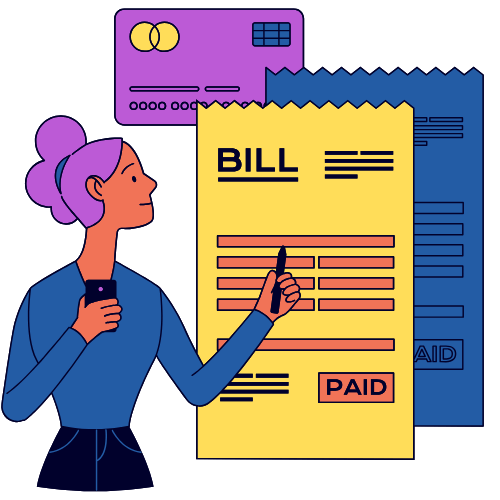
As a busy mom who may or may not have adhd it is a must to set up automatic payments on all my accounts. Next step is keeping money in the checking at all times because half the time I don’t know what’s coming out. I set it up and forget it, just make sure money is in the account.
Paying bills on time has been the angst of my adult life. Being irresponsible with money has come full circle and blown up in my face. I learned over and over again and found out how much better I feel about myself when I keep the money in the bank instead of making dumb purchases. Now I have learned to budget out “spending money” so I don’t worry about bills being paid.
- Payment history makes up 35% of your credit score.
- Removing late payments: 20-60+ points
- Set up automatic payments or reminders to avoid late payments.
- Tip: don’t set up all payments on the same day!
#2. Check Credit Report

This was my first breakthrough in understanding why my credit score struggled. I discovered the strategic importance of prioritizing certain debts over others. Even more surprisingly, I uncovered several accounts that were fully paid off but never reported to the bureaus. After disputing these inaccuracies, my score jumped dramatically as these corrections were processed.
- Get your free credit report from AnnualCreditReport.com
- Dispute Errors
- Keep Track of Your Credit Score
#3. Pay Down Debt

This sounds redundant to paying bills on time, but this is where the real points start adding up. When you pay down debt and it is reported, you will see major positive changes to your credit report. It is important to analyze your debt. Pay of Debt collections first. Then pay down all other debt starting with the highest interest rate. It only makes sense to get rid of the highest interest debt first.
This all might seem very overwhelming, but it’s such an empowering venture that you will be so proud of yourself for doing.
Paying off debt is more simple then you might think.
- Removing collection accounts can increase your credit score 20 to 100+ points
- Pay Off Highest Interest Debt First
- Paying off credit card balances completely could add 10-40 points
- Stay in Contact with Debt Collector (make sure they report your “paid off” to the credit beurau”
- Take Screen shots of “Paid Off” or “Settled” accounts
#4. Use Credit Cards Strategically

What does it mean to strategically use credit cards? Well this has layers but lets start with the simple version. To be honest, I’m not a big credit card supporter. I think the interest rates on most of them should be illegal, however the point is to use a credit card safely and for the intent to build your credit score fast. If you are new to credit cards you don’t want more then 2 or 3 to manage and that is enough to really improve your credit dramatically. The goal here is to show you are responsible with making payments. So when a bank looks at your credit report they see a good long history of responsible use, which includes making payments on time and keeping utilization low.
I use my credit cards for specific things and auto pay them each month plus one more payment halfway before payment is due. This helps me because it keeps the balance low without having it become a large payment. Utilization plays a giant role in the size of your credit score.
Here is an example of how points can drop off your credit score when utilization increases:
Going from 10% to 30% utilization: 10-30 point dropGoing from 30% to 50% utilization: 20-50 point dropGoing from 50% to 70+% utilization: 30-80+ point drop
- Reducing credit card utilization from above 70% to below 30% can increase your credit score 20-40 points
- Keep credit card balances below 30% of your limit (ideally under 10%).
- Make more than one payment a month (I believe this had a positive impact on mine)
- Pay off high balances before the statement date to lower utilization.
- Increase Credit Limit (without increasing spending)
#5. Keep Old Accounts Open

Keeping old accounts open is a key to getting on the bank’s and lenders’ good side. They would like to see a long-term credit history. Even if it’s paid off, you don’t have to have it removed from your credit. Another thing is that you don’t want to open and close credit cards regularly, which causes an alert. It looks like bad management of credit use. If you must close a credit card due to the company changing their terms on you or not committing to their end of the bargain, then do it sooner than later, not right before you are applying for a loan.
Quick Answer. In general, keep unused credit cards open so you benefit from longer average credit history and lower credit utilization. -Experian
- Closing your oldest account can significantly shorten your credit history
- Generally, a 10-30 point drop is possible if it’s your oldest account
- The impact is greater if you have few accounts or a limited credit history
#6. Diversify Your Credit Mix

I’m not saying to load up on loans, all this means is to have a little mix so lenders can see you are responsible with different types of agreements without missing payments or maxing out accounts. However, it is not a good idea to open new loans or credit cards just for the sake of variety or right before a loan assessment (believe me). You don’t want to overload yourself with debt, it’s all about managing it responsibly. No one wants to work just to pay off debt.
Investopedia says: “Diversification thus aims to include assets that are not highly correlated with one another. Most investment professionals agree that, although it does not guarantee against loss, diversification is the most important component of reaching long-range financial goals while minimizing risk”
- Having a mix of credit cards, loans, and other accounts improves your score.
- Don’t open accounts unnecessarily, but a secured credit card or small loan can help.
8. Become an Authorized User
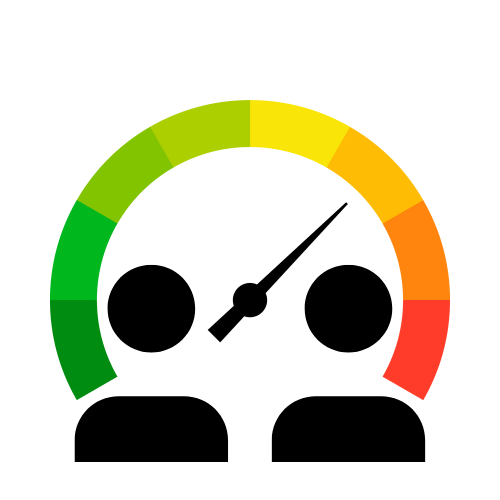
This is not my favorite way and I have never done this because I feel awkward about it but it is an option and maybe for some it really makes sense. I will do this with my kids when they are over 18 if they are open to it, just to give them a jump start on their credit score.
- Ask a family member with a good credit history to add you to their credit card.
- Their positive payment history boosts your score without requiring a new account.
9. Limit Hard Inquiries

You know when I said you don’t want to open new accounts right before you are being assessed for an important loan like a vehicle loan or a mortgage. Hard inquiries are an ugly look to lenders. For one thing if these hard inquiries are rejections this is a big red flag to the important lender you are applying with. It also looks irresponsible, all negatives. Hard inquiries also drop your credit score by up to a
- Every new credit application results in a hard inquiry, which can temporarily drop your score.
- Only apply for new credit when necessary.
- Banks and other lenders do not like seeing several rejected hard inquiries, which raises a red flag
10. Use a Credit-Boosting Tool

I depend on credit tools to keep me on track. I check in on them frequently to make sure nothing new happened that I am unaware of. There are lots of great tools now that can add things like your utilities and rent to your good payment history. You wouldn’t believe how much this helps.
- Services like Experian Boost can add utility and phone bill payments to your credit report.
- Credit Karma helps keep track of your credit history
- Rent Reporter can help if you want your rent payments to help build your credit score. It also allows you to add your utility bills.

Thankyou for visiting, if you have any ideas or tips that help to boost your credit fast please comment below!
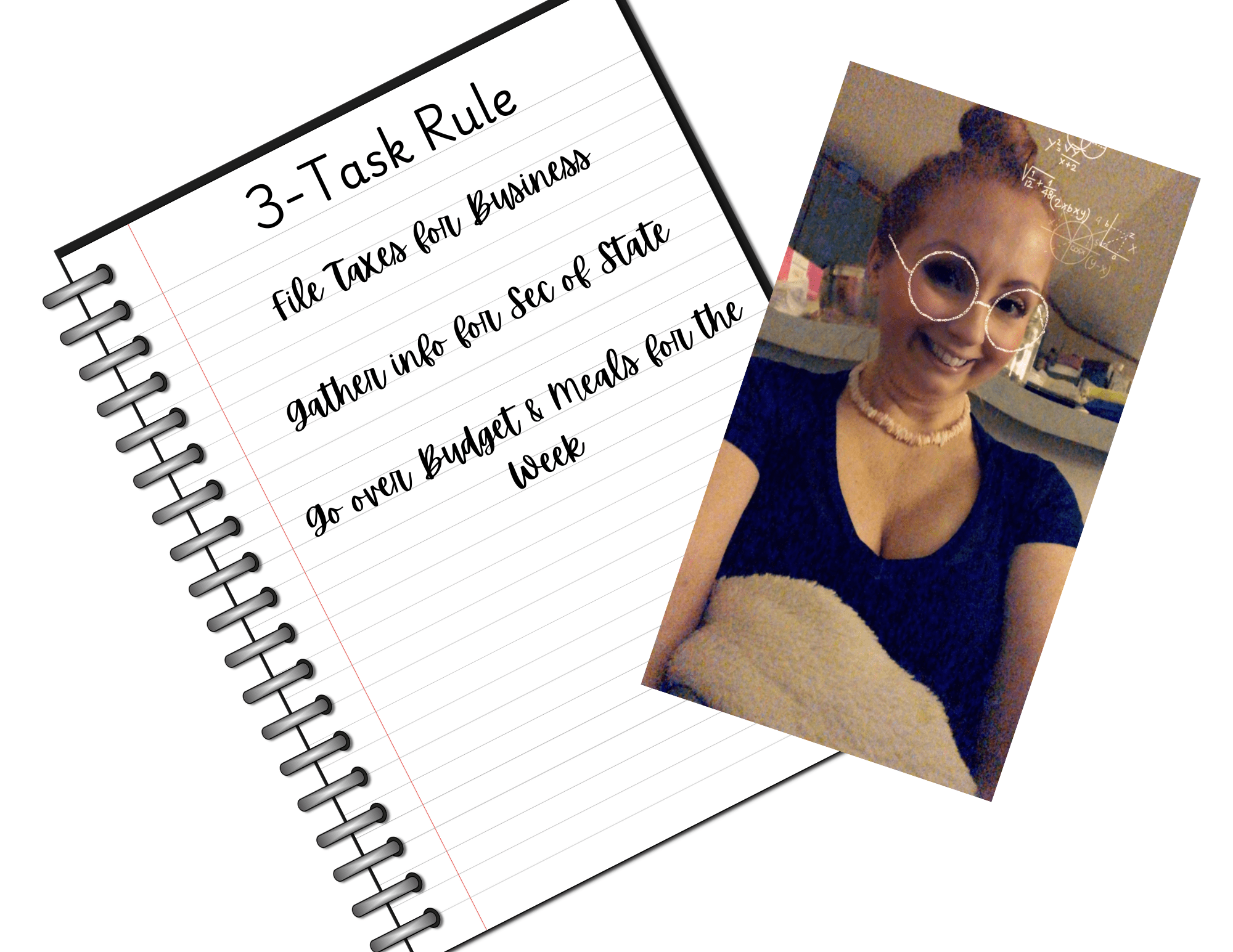
Essential 3-Task Rule for Weekly Planning Upgrades a Moms Life
As a mom, I used to rely on my memory to keep track of everything—tasks, appointments, and commitments—but more often than not, I’d forget something important. This led to feelings of frustration and self-doubt. I even questioned whether I was cut out for motherhood because I struggled to stay on task and accomplish what I needed to. Over time, I discovered the 3-Task Rule and how it transformed my ability to stay organized, focused, and productive.
How I Became More Task-Oriented
Before embracing the 3-Task Rule, I tried countless strategies to manage my life but always ended up burnt out. Therapy helped me set healthy boundaries, and I learned that upgrading a mom’s life begins with upgrading priorities and mastering time management. The key to effective time management is prioritizing sleep and health—without that foundation, staying on top of daily tasks is nearly impossible. The 3-Task Rule has been a game-changer in my busy mom life because it’s flexible and manageable.
What You Need to Implement the 3-Task Rule
Digital or Paper Planners
To effectively implement the 3-Task Rule for weekly planning, you’ll want tools and planners that help you stay organized, focused, and track progress. Here’s a breakdown of tools that can make this process easier:
Paper Planners: If you prefer writing by hand, choose one with weekly layouts, sections for priorities, and plenty of space for task breakdowns. Some great options include:
Amy Knapp’s Family Organizer: Get organized and inspired with the perfect family productivity planner that is parenting tested and mom approved!
Weekly Christian Planner: No frills, classy to the point weekly, monthly planner.
Daily Planner Weekly Monthly Planner: Section for weekly planning and daily schedule.
Digital Planners: If you prefer using tech tools, apps can sync across devices and help you stay organized on the go. Try:
Google Calendar: Perfect for time-blocking and scheduling tasks. (I use this for my business)
Notion: A flexible app where you can create task boards, to-do lists, and detailed weekly planners. Free for individual projects & tasks. Starting at $10/month for business.
Todoist: Great for task tracking with the ability to prioritize and schedule your life. Simplify life for both you and your team with the world’s #1 task manager and to-do list app. I use this daily for my home life.
Apps That Helped Me Implement the 3-Task Rule
There are apps for almost everything, but using technology effectively requires understanding yourself and choosing the right tools. I’ve found some helpful apps that made planning and time management more streamlined. Below are the tools I recommend:
Apps for Organizing Your Week
- Google Calendar: Ideal for time-blocking and scheduling tasks (perfect for business or personal life).
- Notion: A flexible tool to create detailed task boards and weekly planners.
- Todoist: A task manager app that helps you prioritize and organize your life by scheduling your daily tasks. I use this one for at home.
Task Management Tools
- Trello: Create boards and cards to organize tasks and set deadlines.
- Asana: Task management tool with templates for creating and organizing your to-do list.
- ClickUp: Allows you to manage tasks with various views (list, calendar, board) to prioritize your goals.
Time-Blocking & Focus Tools
- Clockify: A free time tracker to monitor how much time you’re dedicating to each task.
- Toggl: Another great time-tracking tool to help you focus on your 3 key tasks daily.
- Forest: Stay focused by growing a virtual tree as you work, motivating you to stay on task.
Review Tools
- Bullet Journal: Create a customized weekly review section to reflect on progress.
- Daily/Weekly Check-In Templates: Use Google Docs, or Notion to track progress, identify improvements, and plan for the next day/week.
Habit Tracking Tools
- Reclaim Habits: Imagine a recurring event that schedules itself, finding the perfect time in your calendar around your existing events. Simply set your scheduling preferences for a new Habit, and let AI help you reach your goals.
- Streaks: A simple app that helps you maintain consistency with your 3 key tasks. Streaks is the to-do list that helps you form good habits. Every day you complete a task, your streak is extended.
The 3-Task Rule: A Simple Yet Powerful Strategy that Upgrades a Mom’s Life
The 3-Task Rule is all about focusing on what truly matters, preventing overwhelm, and making consistent progress. I use a method called “brain dumping” where I take a blank piece of paper and write down everything that comes to mind as far as tasks for the week. Then I pick out the highest to lowest priority and input into my calendar and weekly written planner.
Here’s how you can implement the 3-Task Rule effectively:
Step 1: Identify Your 3 Key Tasks
- Set Clear Goals: What are your most important tasks for the day or week? These should align with your long-term goals.
- Prioritize: From your to-do list, pick the 3 most important tasks that will bring you closer to your objectives.
- Be Specific: Break tasks into smaller, actionable steps. Instead of “work on project,” specify “draft proposal for project X.”
Step 2: Make It Achievable
- Focus on Impact: Aim to complete 3 high-impact tasks rather than numerous small tasks that don’t drive results.
- Be Realistic: Don’t overwhelm yourself. Make sure you have enough time to complete each task without rushing.
Step 3: Time Block Your Day
- Schedule Time for Each Task: Use your calendar or planner to block out time for each task.
- Leave Buffer Time: Add some extra time between tasks to account for unexpected delays or breaks.
Step 4: Avoid Distractions
- Work in Sprints: Use the Pomodoro technique—25 minutes of focused work, followed by a 5-minute break.
- Turn Off Notifications: Minimize distractions so you can stay fully focused on your 3 tasks.
Step 5: Reflect & Adjust
- Review Your Progress: At the end of the day, reflect on what you’ve accomplished.
- Adjust for Tomorrow: Based on what you achieved, choose the next 3 tasks for the following day.
Pro Tip for Weekly Planning
- Start of the Week: Choose 3 major tasks (e.g., project milestones or important personal goals) to accomplish by week’s end.
- Break It Down: For each day, choose 3 smaller tasks that will help you achieve your weekly goals.
Why the 3-Task Rule Works
What makes the 3-Task Rule so effective is its simplicity and manageability. It eliminates the overwhelm of trying to do everything at once and helps you prioritize what truly matters. By focusing on the 3 most important tasks each day, you can make steady progress without burning out.
One of my biggest mindset obstacles has been the belief that I must achieve everything all at once. Whether it’s launching a business, learning a new skill, or pursuing an idea, I used to expect instant results instead of allowing myself a structured, weekly schedule for steady progress. The key to long-term success is learning patience and embracing consistent growth over time.
Download Your Free Printable Template for Weekly Planning to get started with the 3-Task Rule today!

The Life-Changing Question to Ask Before Every Decision for a Better Future
Do you realize that you have the power to make life-changing decisions for a better future just by asking yourself one question? Your life is in your decision making skills period.
Subconsciously, I started doing one simple thing before making a decision, and it instantly transformed my life for the better.
The Power of One Question
Like many people, I used to make choices based on short-term comfort rather than long-term value. My past was filled with unhealthy relationships and coping mechanisms that kept me stuck in cycles of frustration. I was a mom, prioritizing my kids’ well-being, yet my personal decisions didn’t align with self-worth or future growth.
Then, I discovered the power of asking myself a single question before making any decision:
“Is this the best thing for me?”
The Turning Point
For years, I neglected myself, always prioritizing the needs of others also referred to as codependence. But when I started questioning my decisions through the lens of self-worth, and not just self-worth but Godly worth, everything changed. Through therapy and prayer I learned:
- I had the power to make choices that truly benefited me.
- The right people wouldn’t leave my life just because I valued myself.
- Every decision was either building or breaking my self-trust.
- Trusting that I could make healthy decisions for a better future.
- Trusting God that He had my back when I asked “Is this the best thing for me?”
How This Simple Mantra Works
Whenever I faced a decision, I’d hear a small voice in my head ask, “Is this the best thing for you?” The answer was usually clear, and over time, making healthier choices became second nature.
Even when I ignored the question, I quickly saw the consequences and learned to trust my instincts more. I relied on this question. It became a structured plan as if it were the blueprint for the best version of myself.
God’s Guidance in Decision-Making
I wholeheartedly believe that this voice of wisdom was God guiding me. He wants us to make decisions that align with our best interest and His plan for us.
How Self-Reflection and God’s Guidance Transformed My Decision-Making
For years, I struggled with self-worth and confidence in my decisions. But as I sought guidance through therapy and faith in God, I discovered a life-changing practice: intentional self-reflection before making a choice.
Instead of reacting impulsively, I started asking myself, “Is this the best decision for me, my future, and my well-being?” This simple yet powerful question allowed me to pause, analyze, and make better choices rather than hastily falling into old patterns.
The Power of Intentional Decision-Making
Through this process, I realized something profound: I have the power to choose what’s best for me. For so long, I let external expectations shape my decisions, but this shift in mindset gave me control over my life.
- I no longer felt pressured to conform to the persona others expected of me.
- I gained confidence in prioritizing my well-being over societal norms or peer influence.
- I learned that true empowerment comes from aligning my choices with my values, faith, and future goals.
Why Asking Yourself the Right Questions Matters
Making intentional decisions isn’t just about avoiding mistakes—it’s about building self-trust, confidence, and long-term success. When you take the time to reflect, you:
Strengthen Your Self-Worth – Every good decision reinforces your confidence.
Break Negative Cycles – Avoid repeating past mistakes by making mindful choices.
Align with Your True Purpose – Ensure your decisions reflect who you are and who you’re becoming.
How God’s Guidance Strengthens Your Decision-Making
While self-reflection is powerful, I wouldn’t have made these breakthroughs without God’s wisdom and direction. Proverbs 3:5-6 reminds us to “Trust in the Lord with all your heart and lean not on your own understanding; in all your ways submit to Him, and He will make your paths straight.”
By praying, seeking scripture, and listening to God’s voice, I found clarity, peace, and strength to make decisions that align with His plan for me.
You Have the Power to Choose Wisely
If you’ve ever felt lost in your decision-making, know this: You have the ability to choose what’s best for your life. It starts with pausing, reflecting, and seeking guidance—both from within and from God.
Next time you face a choice, ask yourself: “Is this truly the best decision for me?” You’ll be amazed at how this simple question can transform your confidence, future, and faith.
Seeking God’s guidance before making decisions can lead to a more fulfilling, peaceful, and purpose-driven life. Here’s how:
Gives You Clarity & Wisdom
When you ask God for direction, He provides wisdom beyond your understanding. James 1:5 says, “If any of you lacks wisdom, you should ask God, who gives generously to all without finding fault, and it will be given to you.”
Prevents Costly Mistakes
God sees what we can’t. When we rely on Him, He protects us from making choices that could lead to unnecessary pain, loss, or regret. Proverbs 3:5-6 reminds us to “Trust in the Lord with all your heart and lean not on your own understanding; in all your ways submit to him, and he will make your paths straight.”
Brings Peace to Your Heart
When you include God in your decisions, you gain peace knowing you’re following His will. Philippians 4:6-7 encourages us to “not be anxious about anything, but in every situation, by prayer and petition, with thanksgiving, present your requests to God.”
Aligns Your Life with His Plan
God has a purpose for your life, and seeking His guidance ensures you stay on His path rather than following fleeting emotions or worldly pressures. Jeremiah 29:11 says, “For I know the plans I have for you, declares the Lord, plans to prosper you and not to harm you, plans to give you hope and a future.”
Strengthens Your Faith & Trust in God
The more you rely on God for direction, the stronger your faith becomes. You begin to trust His ways over your own, even when things don’t make sense in the moment.
Opens Doors to the Right Opportunities
God’s timing is perfect. Seeking His guidance helps you recognize and seize opportunities that align with His will while avoiding distractions that lead you off course.
Helps You Make Decisions with Integrity
When you seek God’s counsel, you naturally lean toward decisions that align with His Word—choosing honesty, kindness, and righteousness over selfishness or shortcuts.
5 Ways to Seek God’s Guidance in Decisions
- Pray First – Before making a choice, ask God for wisdom, clarity, and discernment.
- Read Scripture – The Bible provides guidance for every aspect of life.
- Listen to the Holy Spirit – Pay attention to that small, inner voice prompting you in the right direction.
- Seek Godly Counsel – Surround yourself with mentors or Christian friends who can provide biblical advice.
- Trust His Timing – Sometimes, waiting on God’s answer is part of the process.
When you let God lead your decisions, your life becomes more intentional, joyful, and purpose-filled.
Try It!
Asking yourself “Is this the best thing for me?” before making a decision can dramatically improve your future in several ways:
Improves Self-Worth & Confidence
When you prioritize what’s truly best for you, you reinforce self-respect and confidence. Over time, this mindset shift will help you make choices that align with your values and long-term happiness.
Prevents Regret & Repeated Mistakes
By evaluating your choices carefully, you avoid impulsive decisions that could lead to regret. This question acts as a safeguard, helping you break free from cycles of bad habits or toxic relationships.
Aligns Your Life with Purpose
Each decision you make shapes your future. By consistently choosing what’s best for you, you’ll move toward a life that aligns with your goals, faith, and personal growth.
Attracts Better People & Opportunities
When you set higher standards for yourself, you naturally attract people who respect and support your growth. This applies to relationships, friendships, and career opportunities.
Strengthens Your Relationship with God
If you believe in divine guidance, this question can be a way to align your choices with God’s plan. Seeking what’s truly best for you often leads to making decisions rooted in wisdom, peace, and faith.
Develops Self-Trust & Inner Peace
By consistently making good decisions, you build trust in yourself. You no longer second-guess or seek validation from others because you know you’re acting in your best interest.
Leads to a Healthier, Happier Life
From relationships to health and career, asking this question helps you make choices that promote well-being and success. You’ll experience less stress, more fulfillment, and a greater sense of control over your future.
Every choice you make is either moving you closer to or further from the life you desire. Asking “Is this the best thing for me?” ensures you’re always moving in the right direction.
Try it today—your future self will thank you!
Have you ever struggled with making decisions that truly serve you? Share your experience below!

